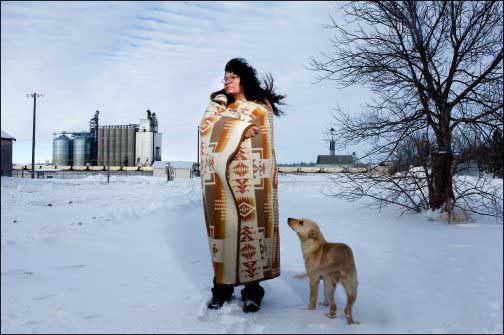
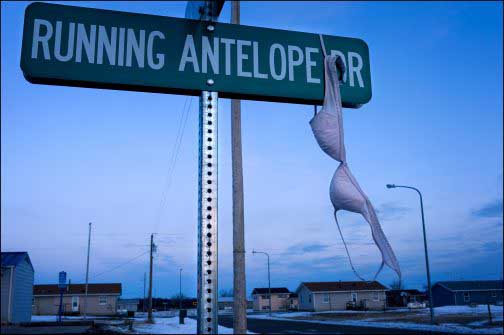
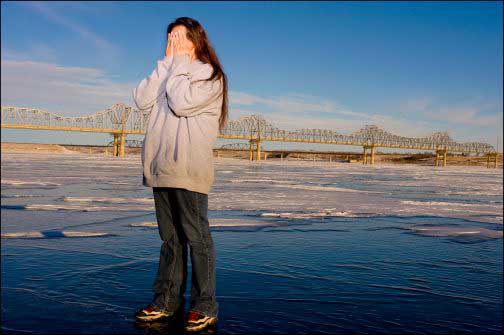
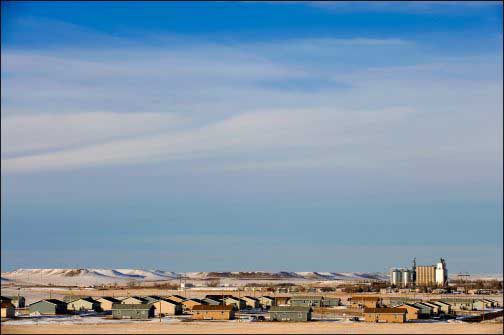
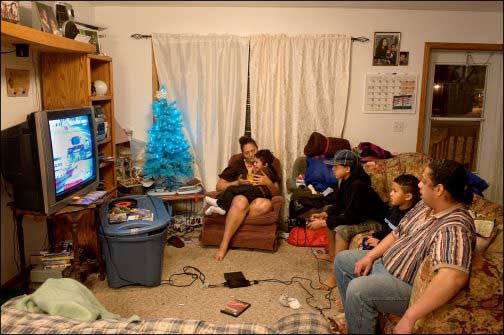

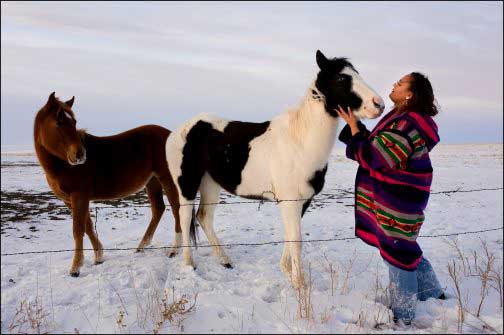
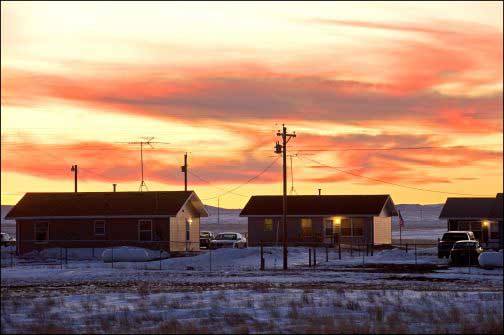
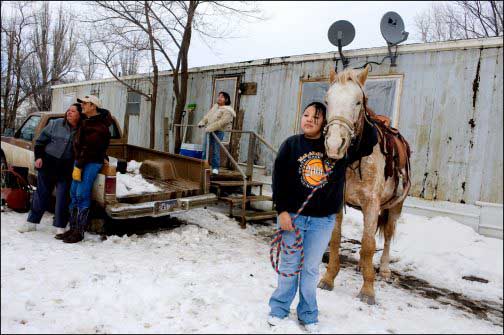
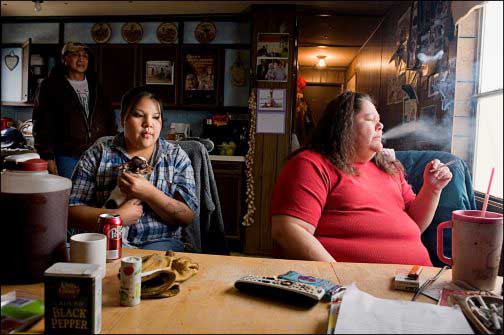

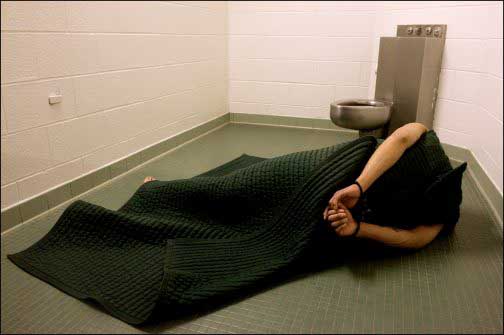
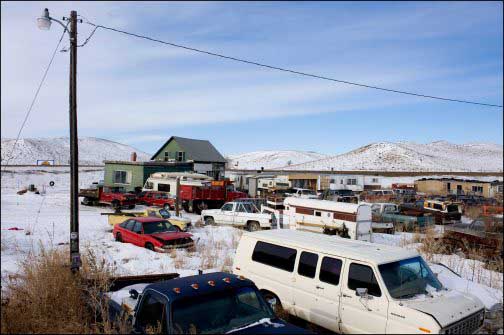
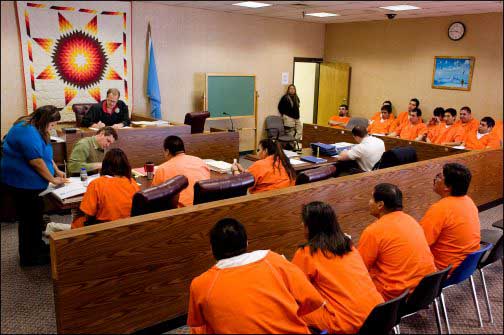
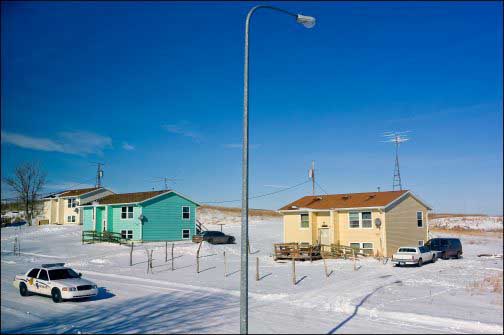


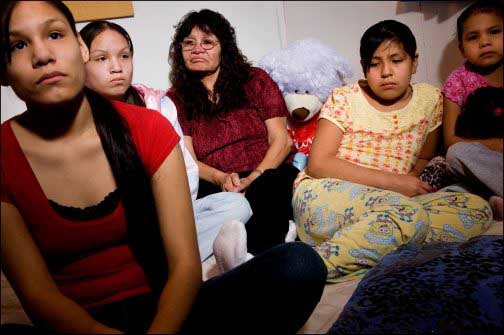
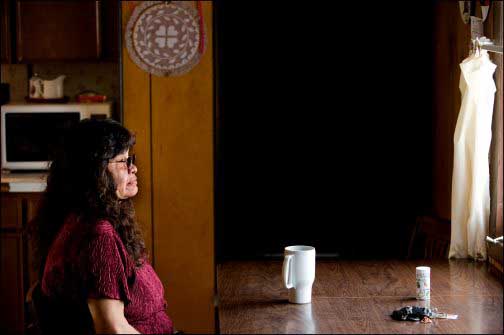
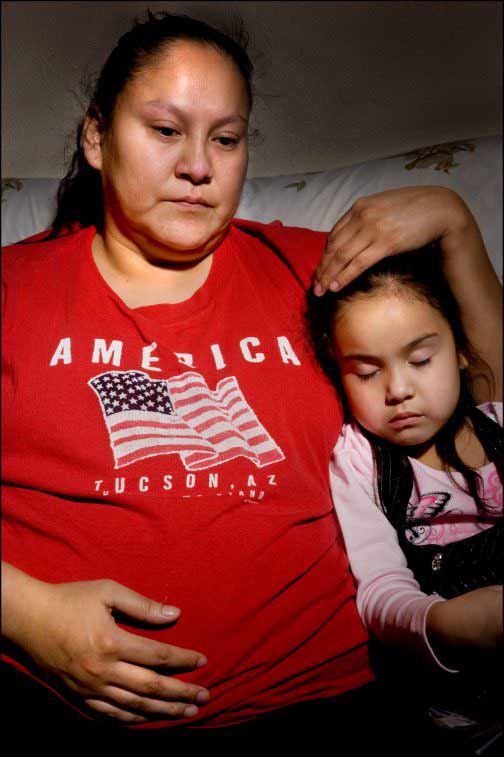
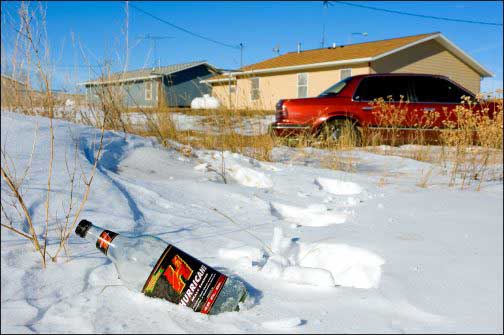
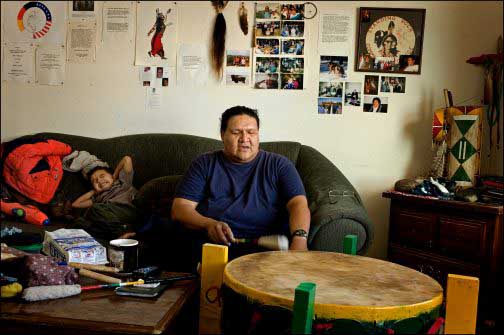
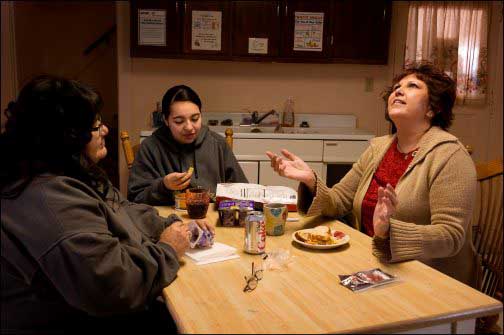


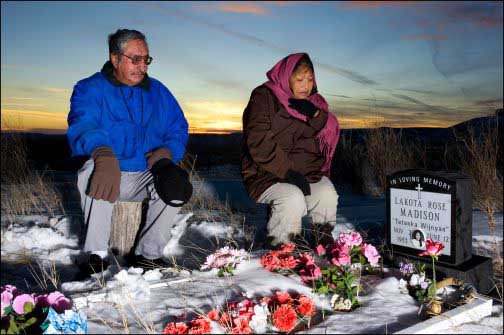
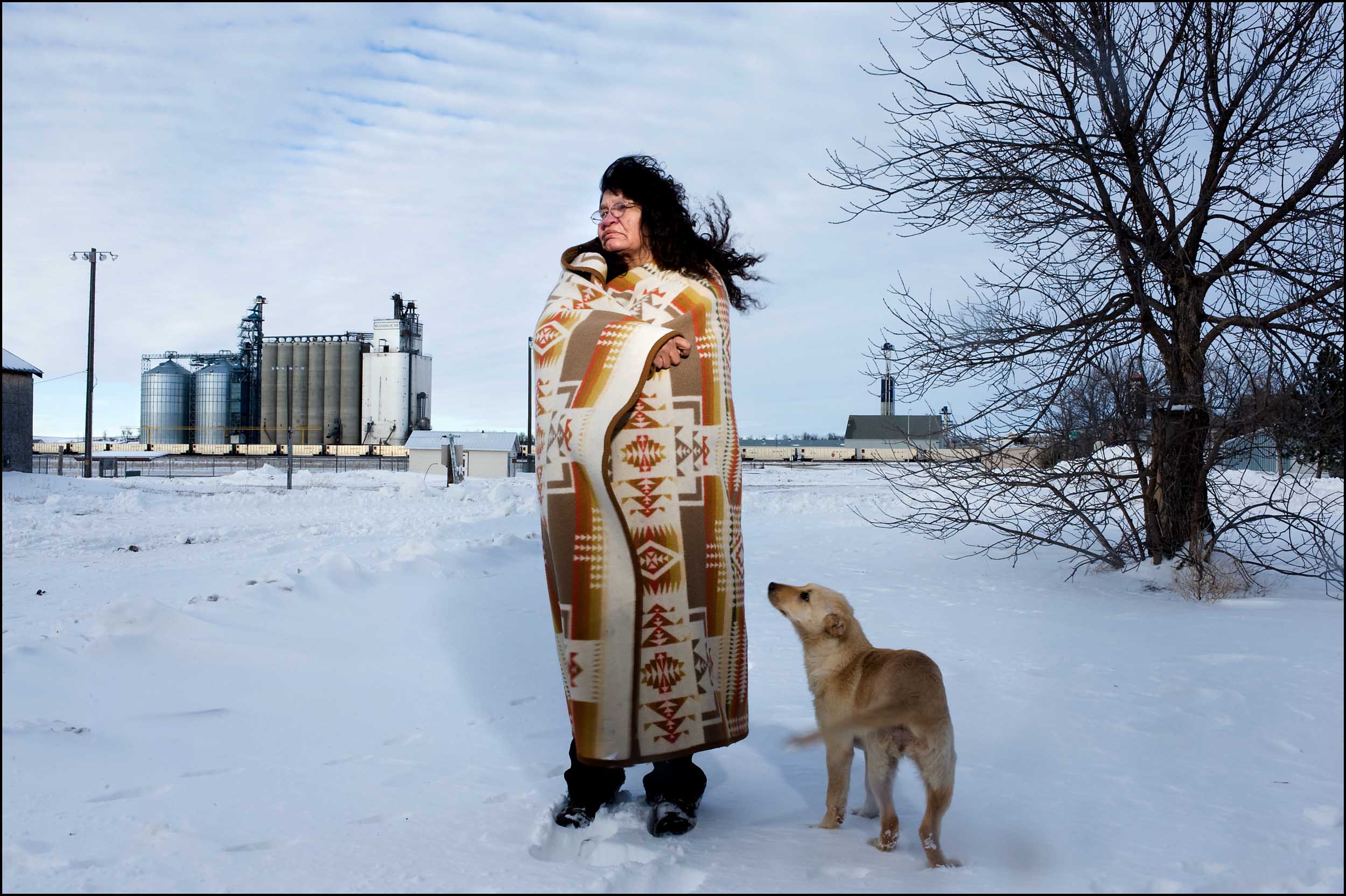
Standing Rock Sioux reservation, USA- 2009: Diane Kills Crow, who lives in a rundown trailer in the farming town of McLaughlin a couple of blocks away from Pretty Bird Woman House, now works as a domestic violence advocate for the reservation’s first shelter, on 2009, in South and North Dakota, USA. ( Photo by Stephan Gladieu/Getty Images)
Standing Rock Sioux reservation, USA- 2009: Diane Kills Crow, who lives in a rundown trailer in the farming town of McLaughlin a couple of blocks away from Pretty Bird Woman House, now works as a domestic violence advocate for the reservation’s first shelter, on 2009, in South and North Dakota, USA. ( Photo by Stephan Gladieu/Getty Images)
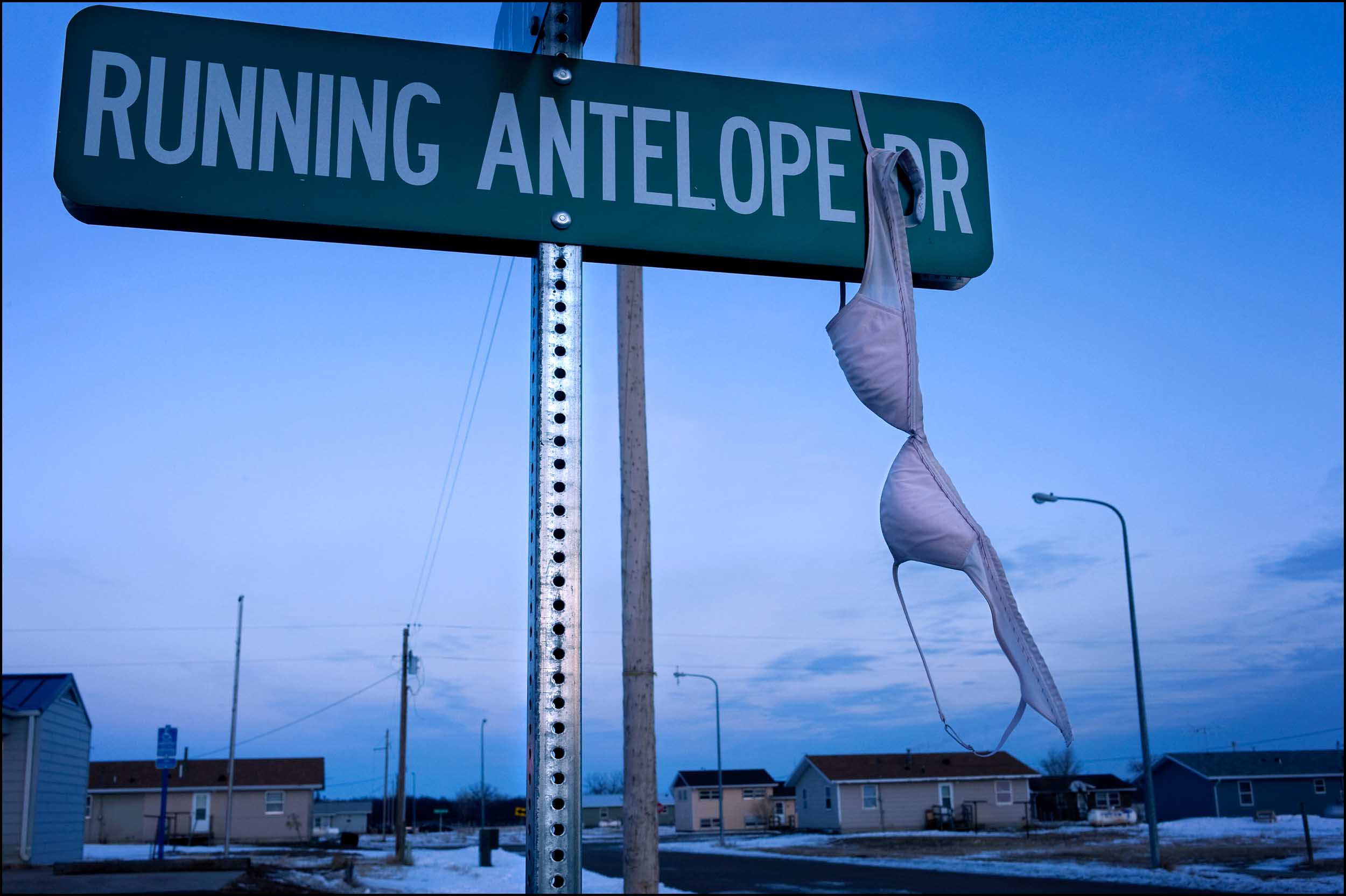
A bra hanging on a street sign in Little Eagle, a small community on the Standing Rock reservation where domestic violence is a fact of life and rape a frequent occurrence. In the territory of legendary Sioux warrior
Sitting Bull, women on an isolated
reservation straddling the states of North
and South Dakota are slowly raising their
voices. The women of Standing Rock
have chosen to speak out against rape
and domestic abuse, hoping to break the
tragic cycle of violence, alcoholism and
misery their children face. In a land of big
skies and endless horizons, the challenge
seems immense. But for these women,
helplessness is not an option.
“Treat your partner as you would a pipe,”
reads a poster on the wall of Pretty Bird
Woman House, a shelter for victims of
domestic violence in the small town of
McLaughlin, at the center of 2.3 million
acre Standing Rock reservation. If
outsiders find this wisdom a bit odd, to
the Lakota Sioux people who live here,
the descendants of Sitting Bull, it makes
perfect sense. According to legend, the
chununpa, or sacred pipe, was bestowed
on the Lakota by the White Buffalo Calf
Woman, a supernatural figure central to
their spiritual belief. It is the holiest of all
symbols, something you would never
harm.
A bra hanging on a street sign in Little Eagle, a small community on the Standing Rock reservation where domestic violence is a fact of life and rape a frequent occurrence. In the territory of legendary Sioux warrior
Sitting Bull, women on an isolated
reservation straddling the states of North
and South Dakota are slowly raising their
voices. The women of Standing Rock
have chosen to speak out against rape
and domestic abuse, hoping to break the
tragic cycle of violence, alcoholism and
misery their children face. In a land of big
skies and endless horizons, the challenge
seems immense. But for these women,
helplessness is not an option.
“Treat your partner as you would a pipe,”
reads a poster on the wall of Pretty Bird
Woman House, a shelter for victims of
domestic violence in the small town of
McLaughlin, at the center of 2.3 million
acre Standing Rock reservation. If
outsiders find this wisdom a bit odd, to
the Lakota Sioux people who live here,
the descendants of Sitting Bull, it makes
perfect sense. According to legend, the
chununpa, or sacred pipe, was bestowed
on the Lakota by the White Buffalo Calf
Woman, a supernatural figure central to
their spiritual belief. It is the holiest of all
symbols, something you would never
harm.
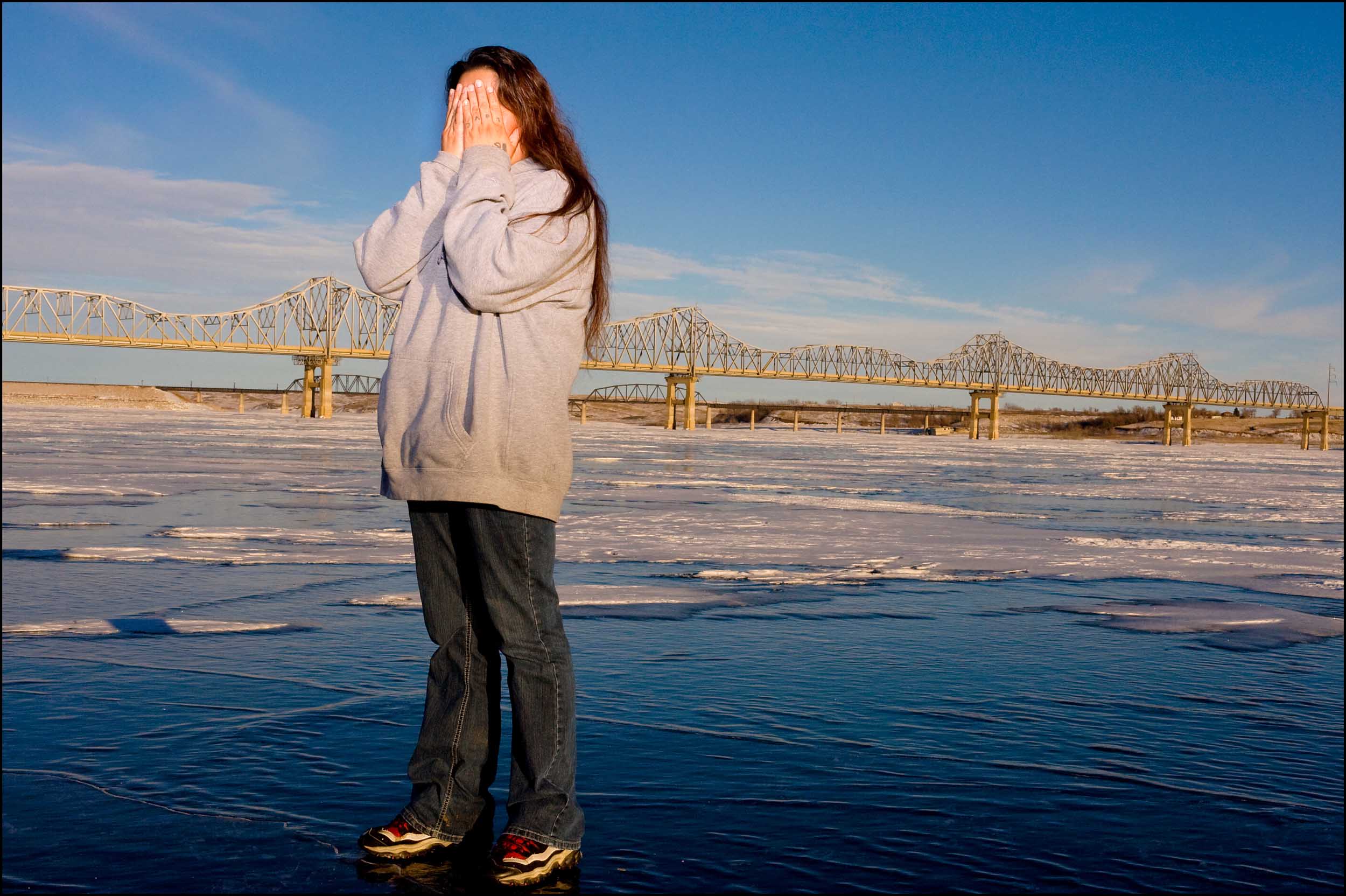
Yvette Cameron, who was raped by a white man three years ago, stands on the frozen Missouri river in front of a bridge which marks the border between Indian country and the white world, on 2009. In the territory of legendary Sioux warrior
Sitting Bull, women on an isolated
reservation straddling the states of North
and South Dakota are slowly raising their
voices. The women of Standing Rock
have chosen to speak out against rape
and domestic abuse, hoping to break the
tragic cycle of violence, alcoholism and
misery their children face. In a land of big
skies and endless horizons, the challenge
seems immense. But for these women,
helplessness is not an option.
“Treat your partner as you would a pipe,”
reads a poster on the wall of Pretty Bird
Woman House, a shelter for victims of
domestic violence in the small town of
McLaughlin, at the center of 2.3 million
acre Standing Rock reservation. If
outsiders find this wisdom a bit odd, to
the Lakota Sioux people who live here,
the descendants of Sitting Bull, it makes
perfect sense. According to legend, the
chununpa, or sacred pipe, was bestowed
on the Lakota by the White Buffalo Calf
Woman, a supernatural figure central to
their spiritual belief. It is the holiest of all
symbols, something you would never
harm.
Yvette Cameron, who was raped by a white man three years ago, stands on the frozen Missouri river in front of a bridge which marks the border between Indian country and the white world, on 2009. In the territory of legendary Sioux warrior
Sitting Bull, women on an isolated
reservation straddling the states of North
and South Dakota are slowly raising their
voices. The women of Standing Rock
have chosen to speak out against rape
and domestic abuse, hoping to break the
tragic cycle of violence, alcoholism and
misery their children face. In a land of big
skies and endless horizons, the challenge
seems immense. But for these women,
helplessness is not an option.
“Treat your partner as you would a pipe,”
reads a poster on the wall of Pretty Bird
Woman House, a shelter for victims of
domestic violence in the small town of
McLaughlin, at the center of 2.3 million
acre Standing Rock reservation. If
outsiders find this wisdom a bit odd, to
the Lakota Sioux people who live here,
the descendants of Sitting Bull, it makes
perfect sense. According to legend, the
chununpa, or sacred pipe, was bestowed
on the Lakota by the White Buffalo Calf
Woman, a supernatural figure central to
their spiritual belief. It is the holiest of all
symbols, something you would never
harm.
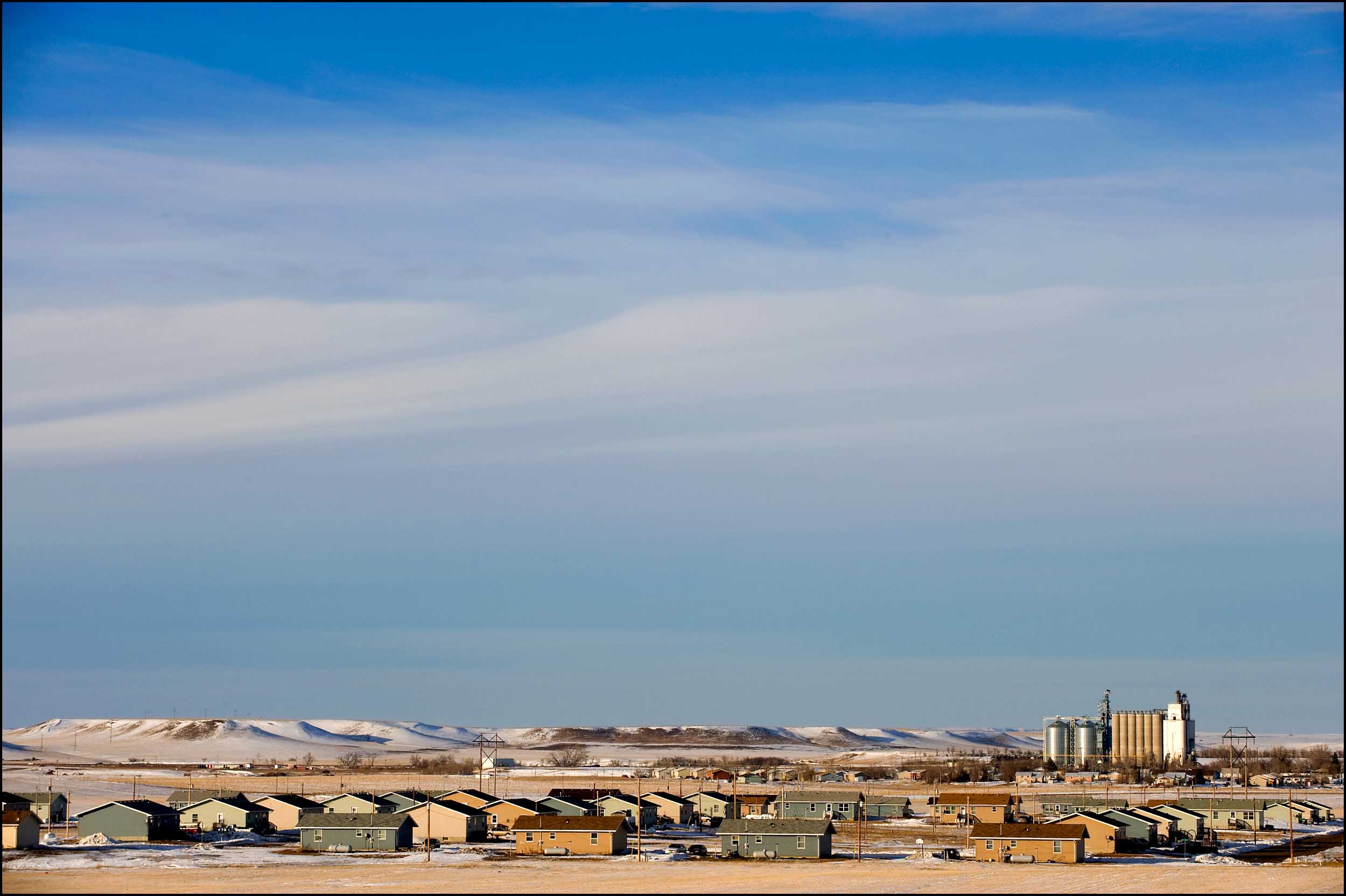
Standing Rock Sioux reservation, USA- 2009: The community of Bear Soldier South, just outside of McLaughlin, is home to Jackie Brown Otter and her family, on 2009, in South and North Dakota, USA. ( Photo by Stephan Gladieu/Getty Images)
Standing Rock Sioux reservation, USA- 2009: The community of Bear Soldier South, just outside of McLaughlin, is home to Jackie Brown Otter and her family, on 2009, in South and North Dakota, USA. ( Photo by Stephan Gladieu/Getty Images)
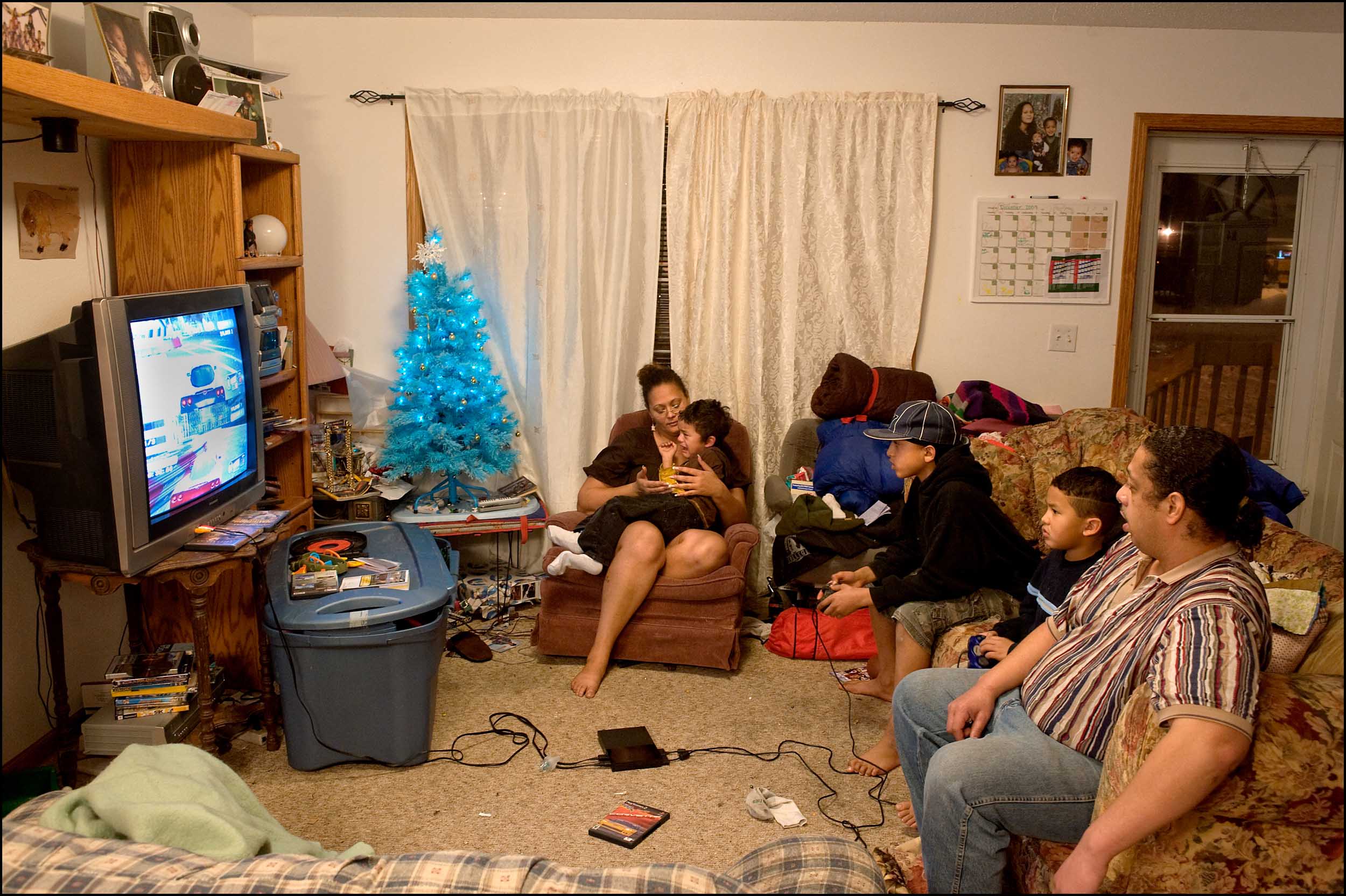
Tinnekkia Williams, a women’s advocate, watches TV with her sons. Part Black, Porto-Rican and Native-American, she lived in Minneapolis (Minnesota) before marrying a man from Standing Rock. A victim of domestic violence, she has just filed for divorce. She wants to develop a sexual assault response team on the reservation to better assist the victims and establish a zero-tolerance policy.n the territory of legendary Sioux warrior
Sitting Bull, women on an isolated
reservation straddling the states of North
and South Dakota are slowly raising their
voices. The women of Standing Rock
have chosen to speak out against rape
and domestic abuse, hoping to break the
tragic cycle of violence, alcoholism and
misery their children face. In a land of big
skies and endless horizons, the challenge
seems immense. But for these women,
helplessness is not an option.
“Treat your partner as you would a pipe,”
reads a poster on the wall of Pretty Bird
Woman House, a shelter for victims of
domestic violence in the small town of
McLaughlin, at the center of 2.3 million
acre Standing Rock reservation. If
outsiders find this wisdom a bit odd, to
the Lakota Sioux people who live here,
the descendants of Sitting Bull, it makes
perfect sense. According to legend, the
chununpa, or sacred pipe, was bestowed
on the Lakota by the White Buffalo Calf
Woman, a supernatural figure central to
their spiritual belief. It is the holiest of all
symbols, something you would never
harm.
Tinnekkia Williams, a women’s advocate, watches TV with her sons. Part Black, Porto-Rican and Native-American, she lived in Minneapolis (Minnesota) before marrying a man from Standing Rock. A victim of domestic violence, she has just filed for divorce. She wants to develop a sexual assault response team on the reservation to better assist the victims and establish a zero-tolerance policy.n the territory of legendary Sioux warrior
Sitting Bull, women on an isolated
reservation straddling the states of North
and South Dakota are slowly raising their
voices. The women of Standing Rock
have chosen to speak out against rape
and domestic abuse, hoping to break the
tragic cycle of violence, alcoholism and
misery their children face. In a land of big
skies and endless horizons, the challenge
seems immense. But for these women,
helplessness is not an option.
“Treat your partner as you would a pipe,”
reads a poster on the wall of Pretty Bird
Woman House, a shelter for victims of
domestic violence in the small town of
McLaughlin, at the center of 2.3 million
acre Standing Rock reservation. If
outsiders find this wisdom a bit odd, to
the Lakota Sioux people who live here,
the descendants of Sitting Bull, it makes
perfect sense. According to legend, the
chununpa, or sacred pipe, was bestowed
on the Lakota by the White Buffalo Calf
Woman, a supernatural figure central to
their spiritual belief. It is the holiest of all
symbols, something you would never
harm.
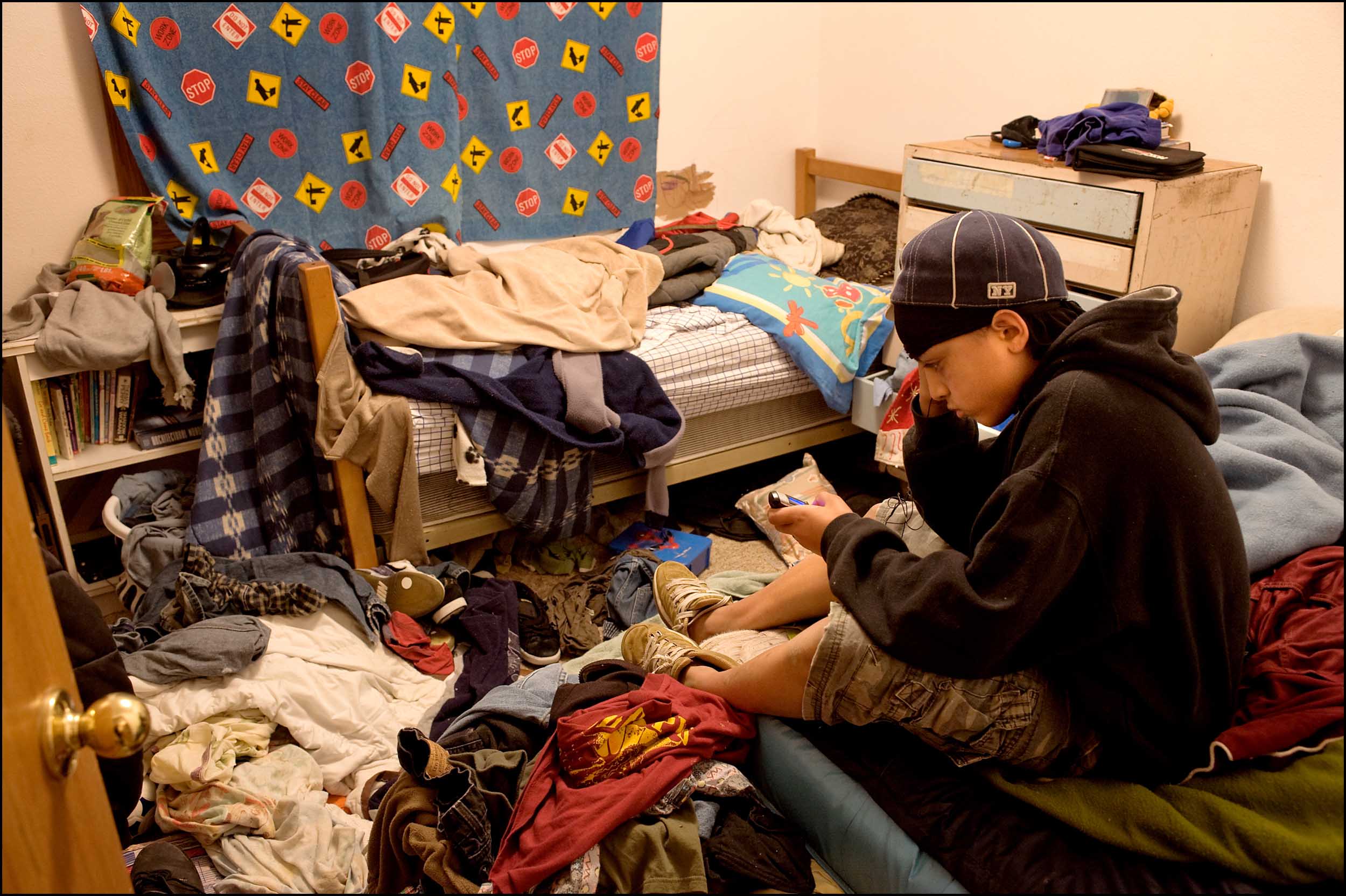
D’ante, Tinnekkia Williams’s 12-year old son, doesn’t like to live on the reservation where boredom is a way of life. n the territory of legendary Sioux warrior
Sitting Bull, women on an isolated
reservation straddling the states of North
and South Dakota are slowly raising their
voices. The women of Standing Rock
have chosen to speak out against rape
and domestic abuse, hoping to break the
tragic cycle of violence, alcoholism and
misery their children face. In a land of big
skies and endless horizons, the challenge
seems immense. But for these women,
helplessness is not an option.
“Treat your partner as you would a pipe,”
reads a poster on the wall of Pretty Bird
Woman House, a shelter for victims of
domestic violence in the small town of
McLaughlin, at the center of 2.3 million
acre Standing Rock reservation. If
outsiders find this wisdom a bit odd, to
the Lakota Sioux people who live here,
the descendants of Sitting Bull, it makes
perfect sense. According to legend, the
chununpa, or sacred pipe, was bestowed
on the Lakota by the White Buffalo Calf
Woman, a supernatural figure central to
their spiritual belief. It is the holiest of all
symbols, something you would never
harm.
D’ante, Tinnekkia Williams’s 12-year old son, doesn’t like to live on the reservation where boredom is a way of life. n the territory of legendary Sioux warrior
Sitting Bull, women on an isolated
reservation straddling the states of North
and South Dakota are slowly raising their
voices. The women of Standing Rock
have chosen to speak out against rape
and domestic abuse, hoping to break the
tragic cycle of violence, alcoholism and
misery their children face. In a land of big
skies and endless horizons, the challenge
seems immense. But for these women,
helplessness is not an option.
“Treat your partner as you would a pipe,”
reads a poster on the wall of Pretty Bird
Woman House, a shelter for victims of
domestic violence in the small town of
McLaughlin, at the center of 2.3 million
acre Standing Rock reservation. If
outsiders find this wisdom a bit odd, to
the Lakota Sioux people who live here,
the descendants of Sitting Bull, it makes
perfect sense. According to legend, the
chununpa, or sacred pipe, was bestowed
on the Lakota by the White Buffalo Calf
Woman, a supernatural figure central to
their spiritual belief. It is the holiest of all
symbols, something you would never
harm.
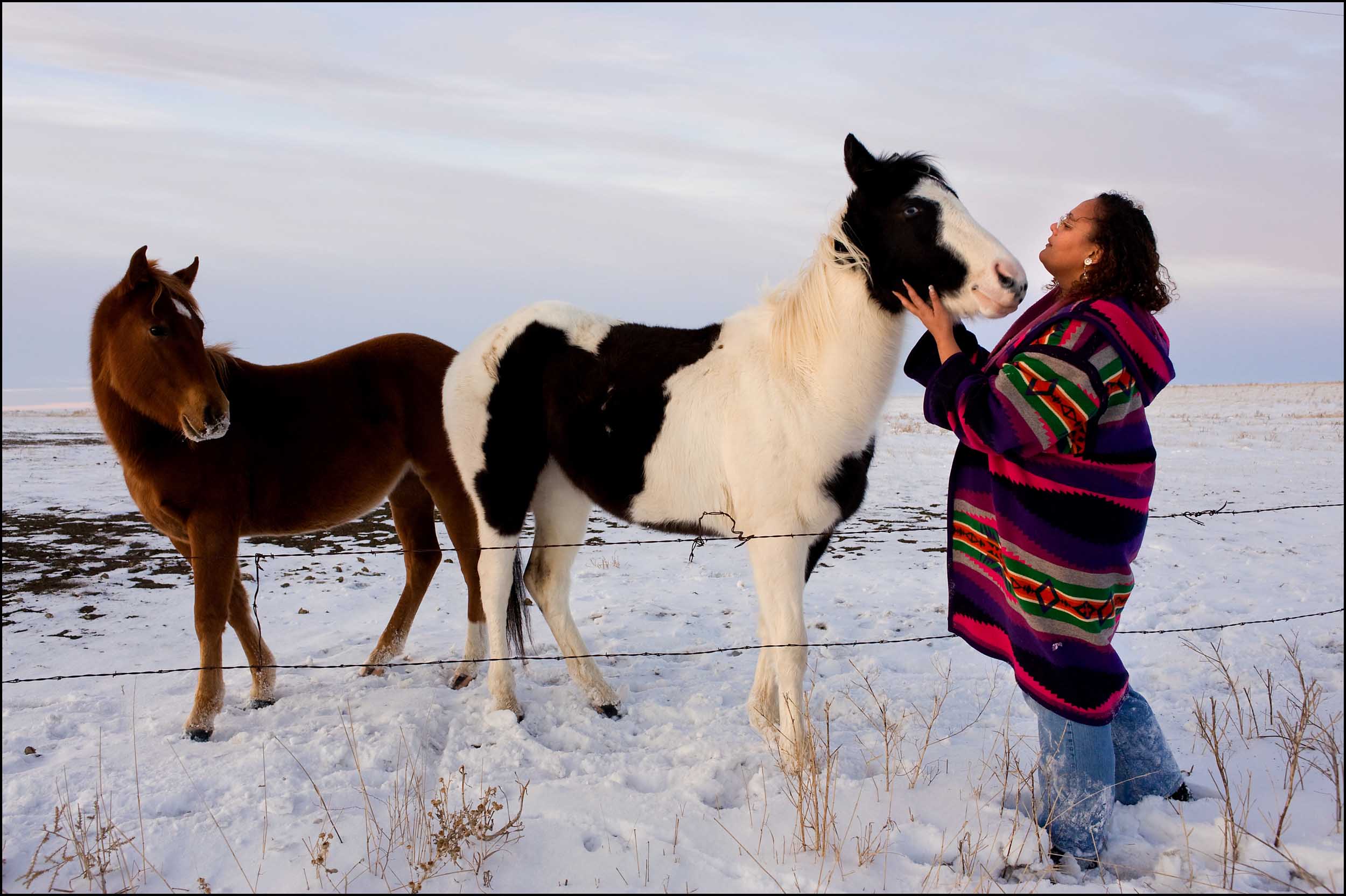
Tinnekkia Williams, a domestic violence advocate, loves Standing Rock for its wilderness and beautiful skies.n the territory of legendary Sioux warrior
Sitting Bull, women on an isolated
reservation straddling the states of North
and South Dakota are slowly raising their
voices. The women of Standing Rock
have chosen to speak out against rape
and domestic abuse, hoping to break the
tragic cycle of violence, alcoholism and
misery their children face. In a land of big
skies and endless horizons, the challenge
seems immense. But for these women,
helplessness is not an option.
“Treat your partner as you would a pipe,”
reads a poster on the wall of Pretty Bird
Woman House, a shelter for victims of
domestic violence in the small town of
McLaughlin, at the center of 2.3 million
acre Standing Rock reservation. If
outsiders find this wisdom a bit odd, to
the Lakota Sioux people who live here,
the descendants of Sitting Bull, it makes
perfect sense. According to legend, the
chununpa, or sacred pipe, was bestowed
on the Lakota by the White Buffalo Calf
Woman, a supernatural figure central to
their spiritual belief. It is the holiest of all
symbols, something you would never
harm.
Tinnekkia Williams, a domestic violence advocate, loves Standing Rock for its wilderness and beautiful skies.n the territory of legendary Sioux warrior
Sitting Bull, women on an isolated
reservation straddling the states of North
and South Dakota are slowly raising their
voices. The women of Standing Rock
have chosen to speak out against rape
and domestic abuse, hoping to break the
tragic cycle of violence, alcoholism and
misery their children face. In a land of big
skies and endless horizons, the challenge
seems immense. But for these women,
helplessness is not an option.
“Treat your partner as you would a pipe,”
reads a poster on the wall of Pretty Bird
Woman House, a shelter for victims of
domestic violence in the small town of
McLaughlin, at the center of 2.3 million
acre Standing Rock reservation. If
outsiders find this wisdom a bit odd, to
the Lakota Sioux people who live here,
the descendants of Sitting Bull, it makes
perfect sense. According to legend, the
chununpa, or sacred pipe, was bestowed
on the Lakota by the White Buffalo Calf
Woman, a supernatural figure central to
their spiritual belief. It is the holiest of all
symbols, something you would never
harm.
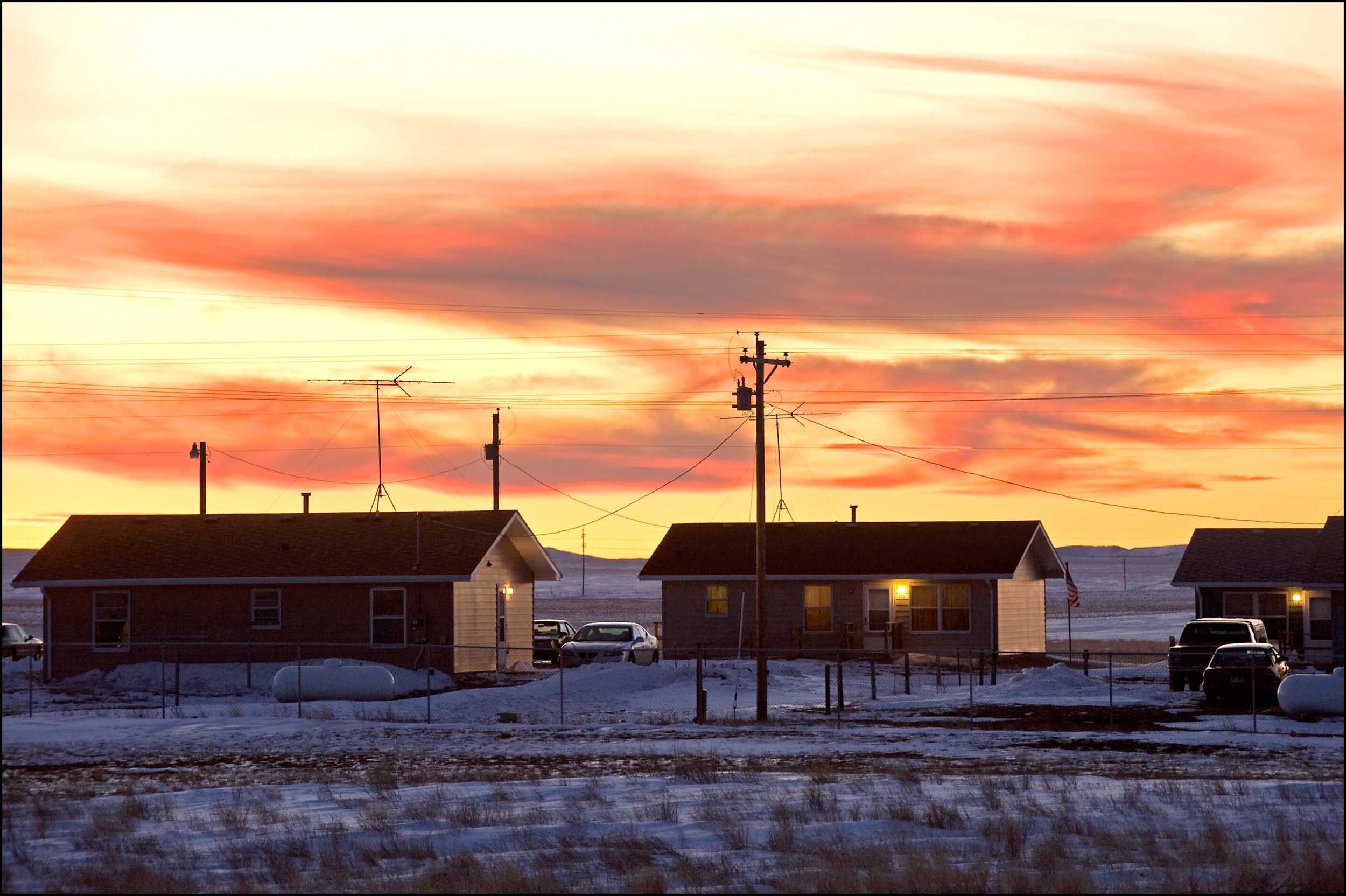
The community of Bear Soldier (near the city of McLaughlin) at Sunset. The community owes it name to Bear Soldier (or Akicita Mahto) who participated in the battle of the Little Big Horn in 1876. In the territory of legendary Sioux warrior
Sitting Bull, women on an isolated
reservation straddling the states of North
and South Dakota are slowly raising their
voices. The women of Standing Rock
have chosen to speak out against rape
and domestic abuse, hoping to break the
tragic cycle of violence, alcoholism and
misery their children face. In a land of big
skies and endless horizons, the challenge
seems immense. But for these women,
helplessness is not an option.
“Treat your partner as you would a pipe,”
reads a poster on the wall of Pretty Bird
Woman House, a shelter for victims of
domestic violence in the small town of
McLaughlin, at the center of 2.3 million
acre Standing Rock reservation. If
outsiders find this wisdom a bit odd, to
the Lakota Sioux people who live here,
the descendants of Sitting Bull, it makes
perfect sense. According to legend, the
chununpa, or sacred pipe, was bestowed
on the Lakota by the White Buffalo Calf
Woman, a supernatural figure central to
their spiritual belief. It is the holiest of all
symbols, something you would never
harm.
The community of Bear Soldier (near the city of McLaughlin) at Sunset. The community owes it name to Bear Soldier (or Akicita Mahto) who participated in the battle of the Little Big Horn in 1876. In the territory of legendary Sioux warrior
Sitting Bull, women on an isolated
reservation straddling the states of North
and South Dakota are slowly raising their
voices. The women of Standing Rock
have chosen to speak out against rape
and domestic abuse, hoping to break the
tragic cycle of violence, alcoholism and
misery their children face. In a land of big
skies and endless horizons, the challenge
seems immense. But for these women,
helplessness is not an option.
“Treat your partner as you would a pipe,”
reads a poster on the wall of Pretty Bird
Woman House, a shelter for victims of
domestic violence in the small town of
McLaughlin, at the center of 2.3 million
acre Standing Rock reservation. If
outsiders find this wisdom a bit odd, to
the Lakota Sioux people who live here,
the descendants of Sitting Bull, it makes
perfect sense. According to legend, the
chununpa, or sacred pipe, was bestowed
on the Lakota by the White Buffalo Calf
Woman, a supernatural figure central to
their spiritual belief. It is the holiest of all
symbols, something you would never
harm.
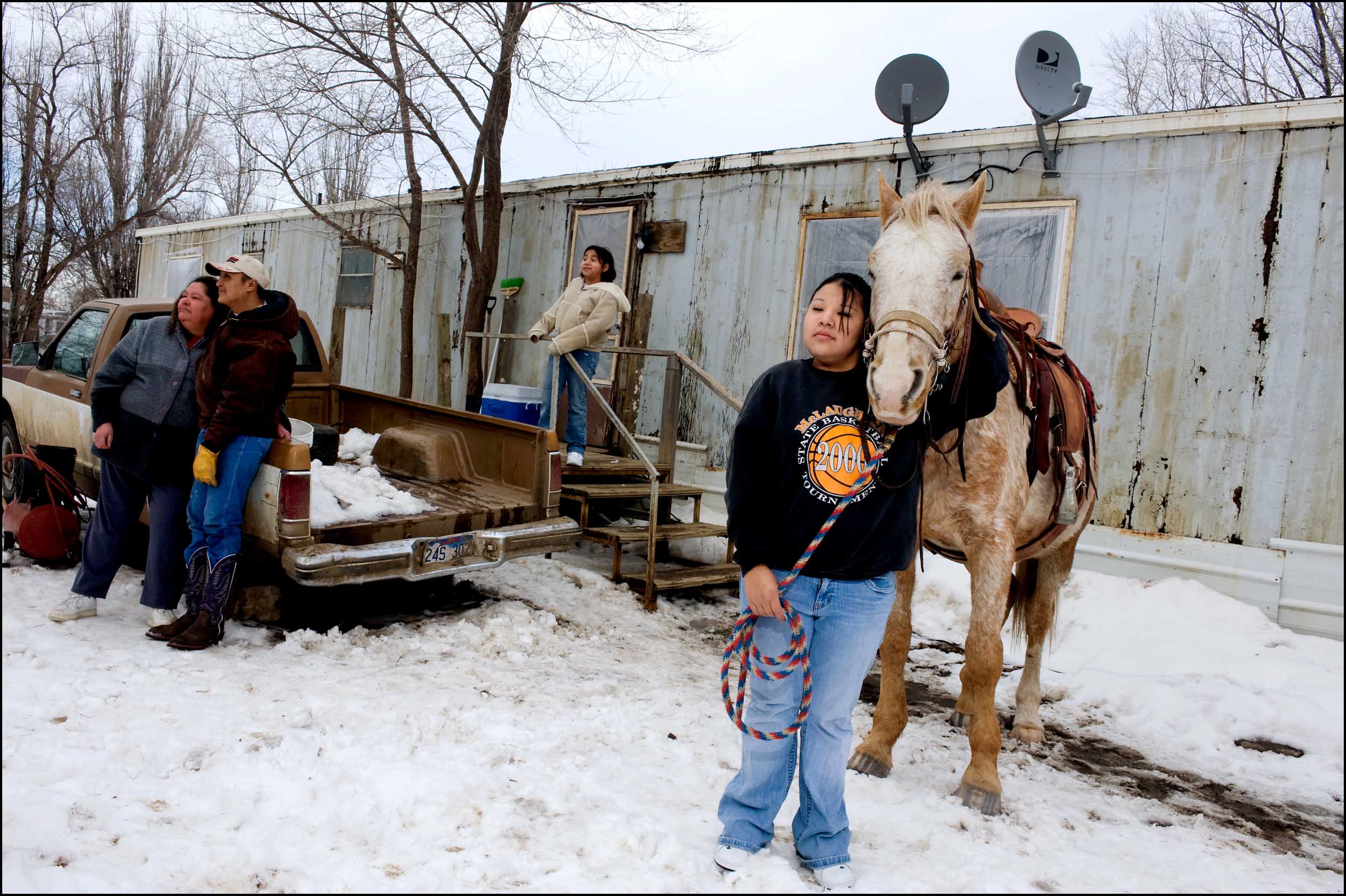
Georgia Little Shield, the director of Pretty Bird Woman House, with her husband Norman, and their two foster daughters, 16-year-old Kristy and 8-year-old Krystal, in front of their dilapidated trailer on the Cheyenne reservation, south from Standing Rock. The family hopes to move in a brand new home by the summer. n the territory of legendary Sioux warrior
Sitting Bull, women on an isolated
reservation straddling the states of North
and South Dakota are slowly raising their
voices. The women of Standing Rock
have chosen to speak out against rape
and domestic abuse, hoping to break the
tragic cycle of violence, alcoholism and
misery their children face. In a land of big
skies and endless horizons, the challenge
seems immense. But for these women,
helplessness is not an option.
“Treat your partner as you would a pipe,”
reads a poster on the wall of Pretty Bird
Woman House, a shelter for victims of
domestic violence in the small town of
McLaughlin, at the center of 2.3 million
acre Standing Rock reservation. If
outsiders find this wisdom a bit odd, to
the Lakota Sioux people who live here,
the descendants of Sitting Bull, it makes
perfect sense. According to legend, the
chununpa, or sacred pipe, was bestowed
on the Lakota by the White Buffalo Calf
Woman, a supernatural figure central to
their spiritual belief. It is the holiest of all
symbols, something you would never
harm.
Georgia Little Shield, the director of Pretty Bird Woman House, with her husband Norman, and their two foster daughters, 16-year-old Kristy and 8-year-old Krystal, in front of their dilapidated trailer on the Cheyenne reservation, south from Standing Rock. The family hopes to move in a brand new home by the summer. n the territory of legendary Sioux warrior
Sitting Bull, women on an isolated
reservation straddling the states of North
and South Dakota are slowly raising their
voices. The women of Standing Rock
have chosen to speak out against rape
and domestic abuse, hoping to break the
tragic cycle of violence, alcoholism and
misery their children face. In a land of big
skies and endless horizons, the challenge
seems immense. But for these women,
helplessness is not an option.
“Treat your partner as you would a pipe,”
reads a poster on the wall of Pretty Bird
Woman House, a shelter for victims of
domestic violence in the small town of
McLaughlin, at the center of 2.3 million
acre Standing Rock reservation. If
outsiders find this wisdom a bit odd, to
the Lakota Sioux people who live here,
the descendants of Sitting Bull, it makes
perfect sense. According to legend, the
chununpa, or sacred pipe, was bestowed
on the Lakota by the White Buffalo Calf
Woman, a supernatural figure central to
their spiritual belief. It is the holiest of all
symbols, something you would never
harm.
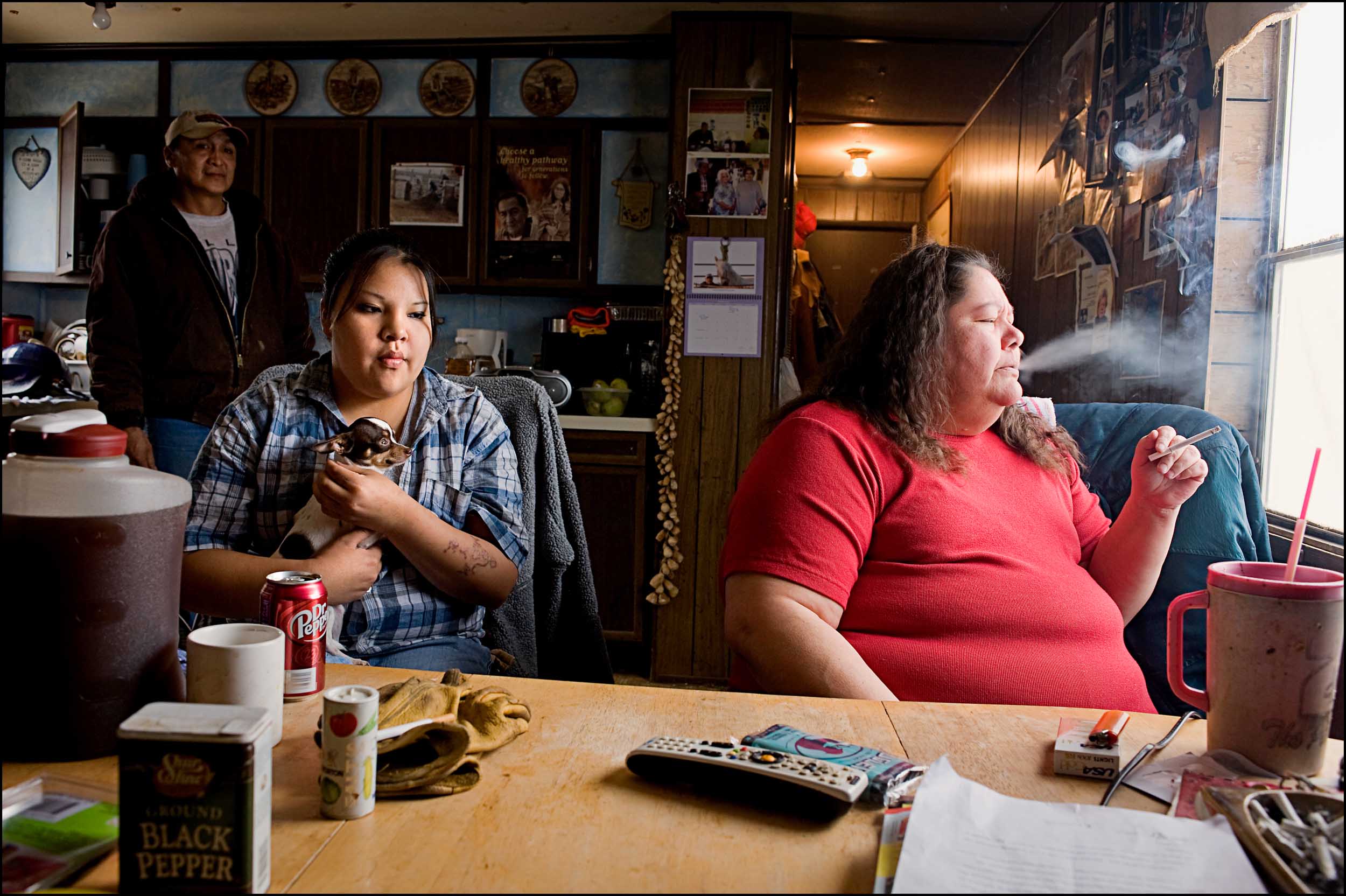
Georgia Little Shield, the director of Pretty Bird Woman House, with her husband and Kristy, their 16-year-old foster daughter.n the territory of legendary Sioux warrior
Sitting Bull, women on an isolated
reservation straddling the states of North
and South Dakota are slowly raising their
voices. The women of Standing Rock
have chosen to speak out against rape
and domestic abuse, hoping to break the
tragic cycle of violence, alcoholism and
misery their children face. In a land of big
skies and endless horizons, the challenge
seems immense. But for these women,
helplessness is not an option.
“Treat your partner as you would a pipe,”
reads a poster on the wall of Pretty Bird
Woman House, a shelter for victims of
domestic violence in the small town of
McLaughlin, at the center of 2.3 million
acre Standing Rock reservation. If
outsiders find this wisdom a bit odd, to
the Lakota Sioux people who live here,
the descendants of Sitting Bull, it makes
perfect sense. According to legend, the
chununpa, or sacred pipe, was bestowed
on the Lakota by the White Buffalo Calf
Woman, a supernatural figure central to
their spiritual belief. It is the holiest of all
symbols, something you would never
harm.
Georgia Little Shield, the director of Pretty Bird Woman House, with her husband and Kristy, their 16-year-old foster daughter.n the territory of legendary Sioux warrior
Sitting Bull, women on an isolated
reservation straddling the states of North
and South Dakota are slowly raising their
voices. The women of Standing Rock
have chosen to speak out against rape
and domestic abuse, hoping to break the
tragic cycle of violence, alcoholism and
misery their children face. In a land of big
skies and endless horizons, the challenge
seems immense. But for these women,
helplessness is not an option.
“Treat your partner as you would a pipe,”
reads a poster on the wall of Pretty Bird
Woman House, a shelter for victims of
domestic violence in the small town of
McLaughlin, at the center of 2.3 million
acre Standing Rock reservation. If
outsiders find this wisdom a bit odd, to
the Lakota Sioux people who live here,
the descendants of Sitting Bull, it makes
perfect sense. According to legend, the
chununpa, or sacred pipe, was bestowed
on the Lakota by the White Buffalo Calf
Woman, a supernatural figure central to
their spiritual belief. It is the holiest of all
symbols, something you would never
harm.
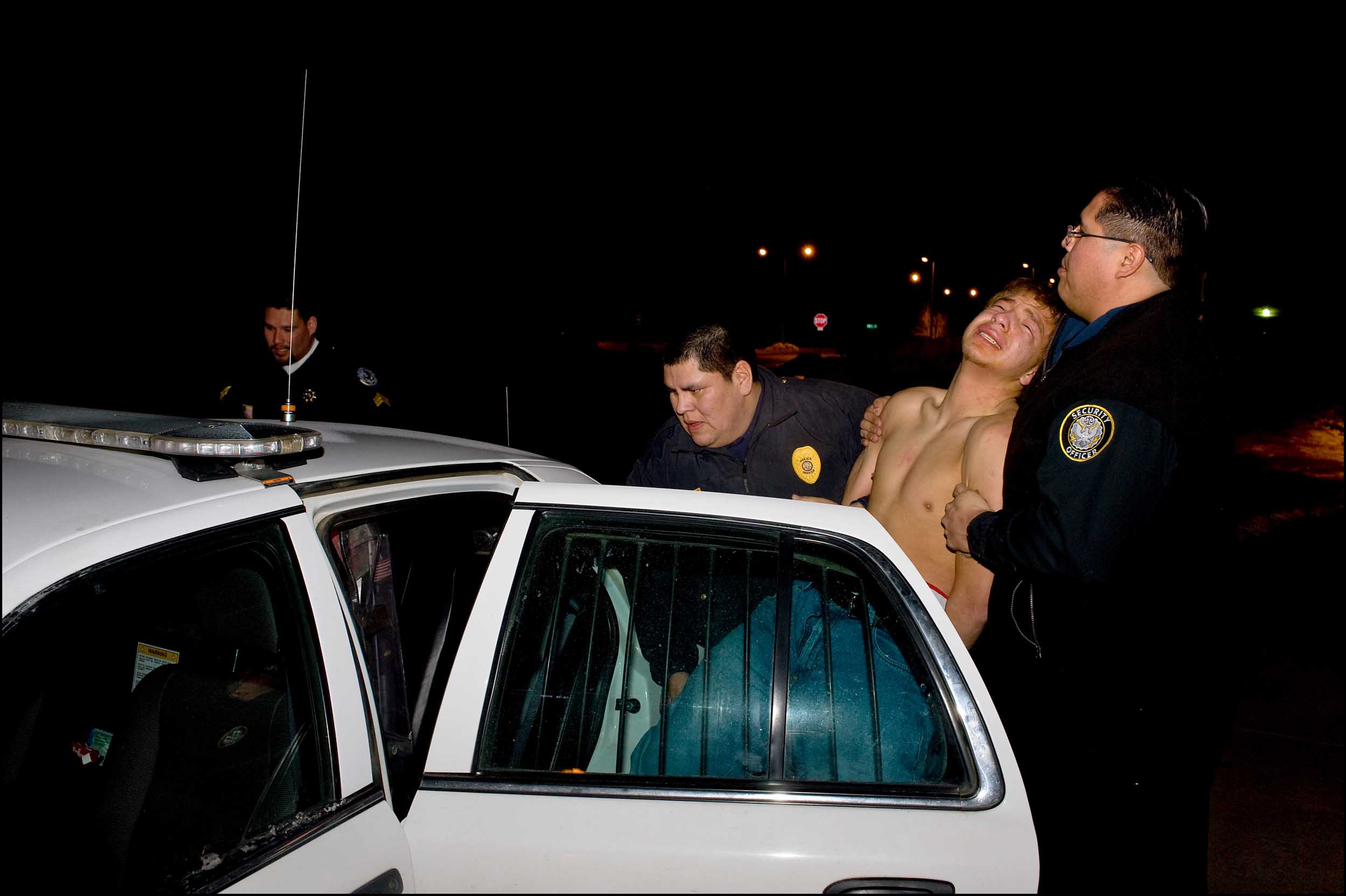
A perpetrator of domestic violence arrested in front of his ex girl's friend house after after assaulting her . In the territory of legendary Sioux warrior
Sitting Bull, women on an isolated
reservation straddling the states of North
and South Dakota are slowly raising their
voices. The women of Standing Rock
have chosen to speak out against rape
and domestic abuse, hoping to break the
tragic cycle of violence, alcoholism and
misery their children face. In a land of big
skies and endless horizons, the challenge
seems immense. But for these women,
helplessness is not an option.
“Treat your partner as you would a pipe,”
reads a poster on the wall of Pretty Bird
Woman House, a shelter for victims of
domestic violence in the small town of
McLaughlin, at the center of 2.3 million
acre Standing Rock reservation. If
outsiders find this wisdom a bit odd, to
the Lakota Sioux people who live here,
the descendants of Sitting Bull, it makes
perfect sense. According to legend, the
chununpa, or sacred pipe, was bestowed
on the Lakota by the White Buffalo Calf
Woman, a supernatural figure central to
their spiritual belief. It is the holiest of all
symbols, something you would never
harm.
A perpetrator of domestic violence arrested in front of his ex girl's friend house after after assaulting her . In the territory of legendary Sioux warrior
Sitting Bull, women on an isolated
reservation straddling the states of North
and South Dakota are slowly raising their
voices. The women of Standing Rock
have chosen to speak out against rape
and domestic abuse, hoping to break the
tragic cycle of violence, alcoholism and
misery their children face. In a land of big
skies and endless horizons, the challenge
seems immense. But for these women,
helplessness is not an option.
“Treat your partner as you would a pipe,”
reads a poster on the wall of Pretty Bird
Woman House, a shelter for victims of
domestic violence in the small town of
McLaughlin, at the center of 2.3 million
acre Standing Rock reservation. If
outsiders find this wisdom a bit odd, to
the Lakota Sioux people who live here,
the descendants of Sitting Bull, it makes
perfect sense. According to legend, the
chununpa, or sacred pipe, was bestowed
on the Lakota by the White Buffalo Calf
Woman, a supernatural figure central to
their spiritual belief. It is the holiest of all
symbols, something you would never
harm.
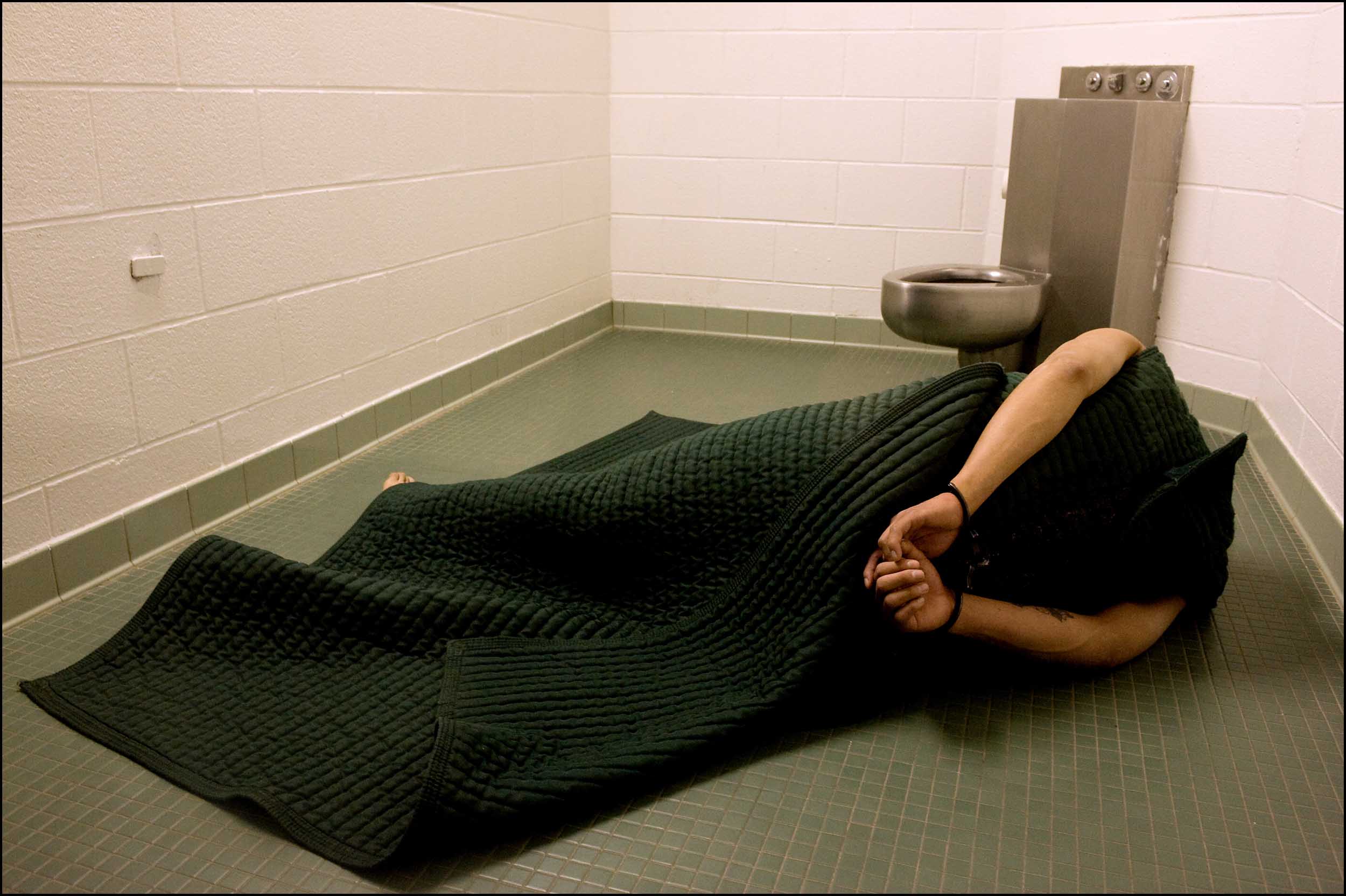
Offenders brought to jail under the influence of drugs or/and alcohol are isolated in a cell until they sober up.
Offenders brought to jail under the influence of drugs or/and alcohol are isolated in a cell until they sober up.
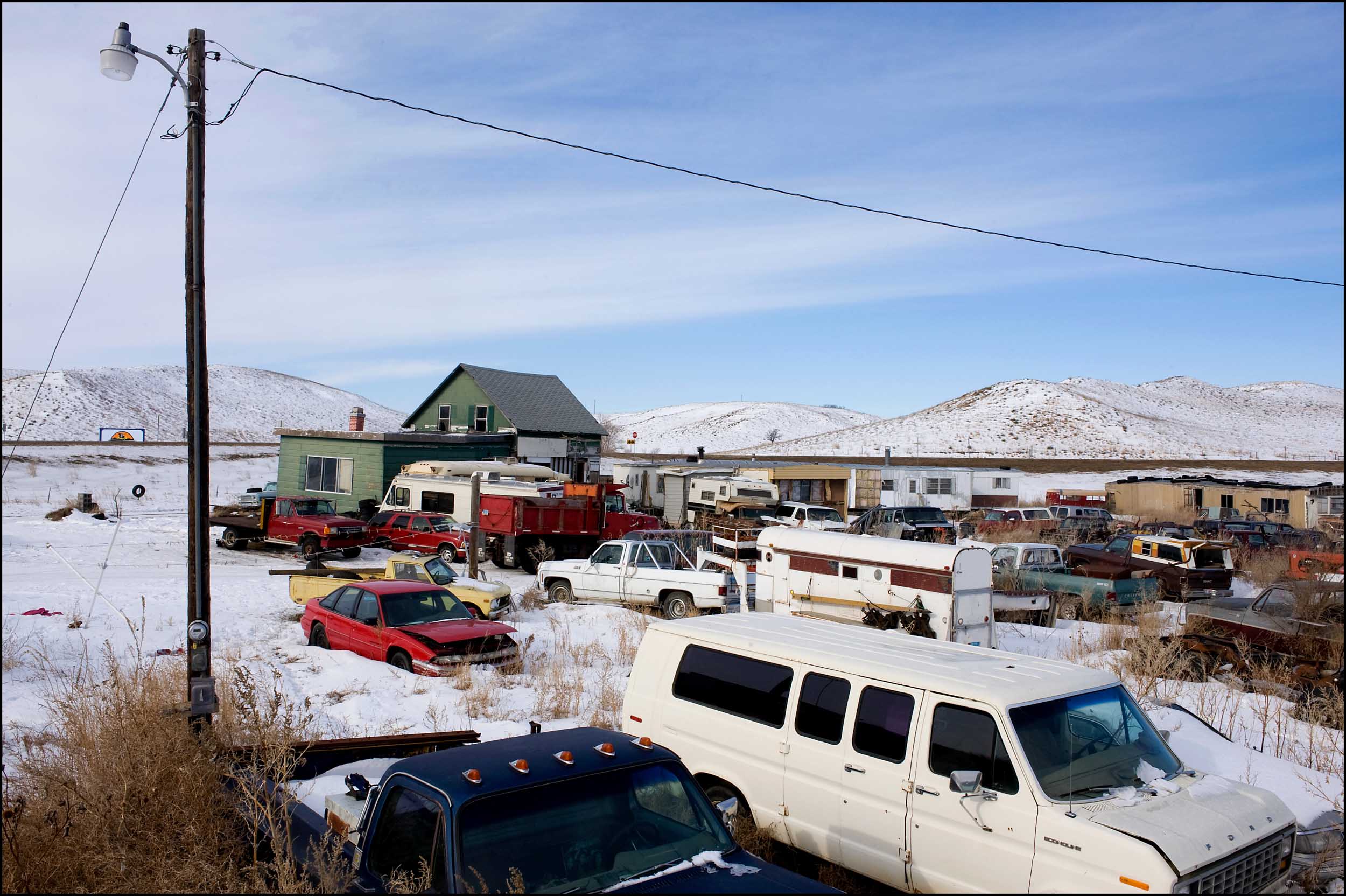
Rusted old cars and dilapidated trailers are common sights at Standing Rock. n the territory of legendary Sioux warrior
Sitting Bull, women on an isolated
reservation straddling the states of North
and South Dakota are slowly raising their
voices. The women of Standing Rock
have chosen to speak out against rape
and domestic abuse, hoping to break the
tragic cycle of violence, alcoholism and
misery their children face. In a land of big
skies and endless horizons, the challenge
seems immense. But for these women,
helplessness is not an option.
“Treat your partner as you would a pipe,”
reads a poster on the wall of Pretty Bird
Woman House, a shelter for victims of
domestic violence in the small town of
McLaughlin, at the center of 2.3 million
acre Standing Rock reservation. If
outsiders find this wisdom a bit odd, to
the Lakota Sioux people who live here,
the descendants of Sitting Bull, it makes
perfect sense. According to legend, the
chununpa, or sacred pipe, was bestowed
on the Lakota by the White Buffalo Calf
Woman, a supernatural figure central to
their spiritual belief. It is the holiest of all
symbols, something you would never
harm.
Rusted old cars and dilapidated trailers are common sights at Standing Rock. n the territory of legendary Sioux warrior
Sitting Bull, women on an isolated
reservation straddling the states of North
and South Dakota are slowly raising their
voices. The women of Standing Rock
have chosen to speak out against rape
and domestic abuse, hoping to break the
tragic cycle of violence, alcoholism and
misery their children face. In a land of big
skies and endless horizons, the challenge
seems immense. But for these women,
helplessness is not an option.
“Treat your partner as you would a pipe,”
reads a poster on the wall of Pretty Bird
Woman House, a shelter for victims of
domestic violence in the small town of
McLaughlin, at the center of 2.3 million
acre Standing Rock reservation. If
outsiders find this wisdom a bit odd, to
the Lakota Sioux people who live here,
the descendants of Sitting Bull, it makes
perfect sense. According to legend, the
chununpa, or sacred pipe, was bestowed
on the Lakota by the White Buffalo Calf
Woman, a supernatural figure central to
their spiritual belief. It is the holiest of all
symbols, something you would never
harm.
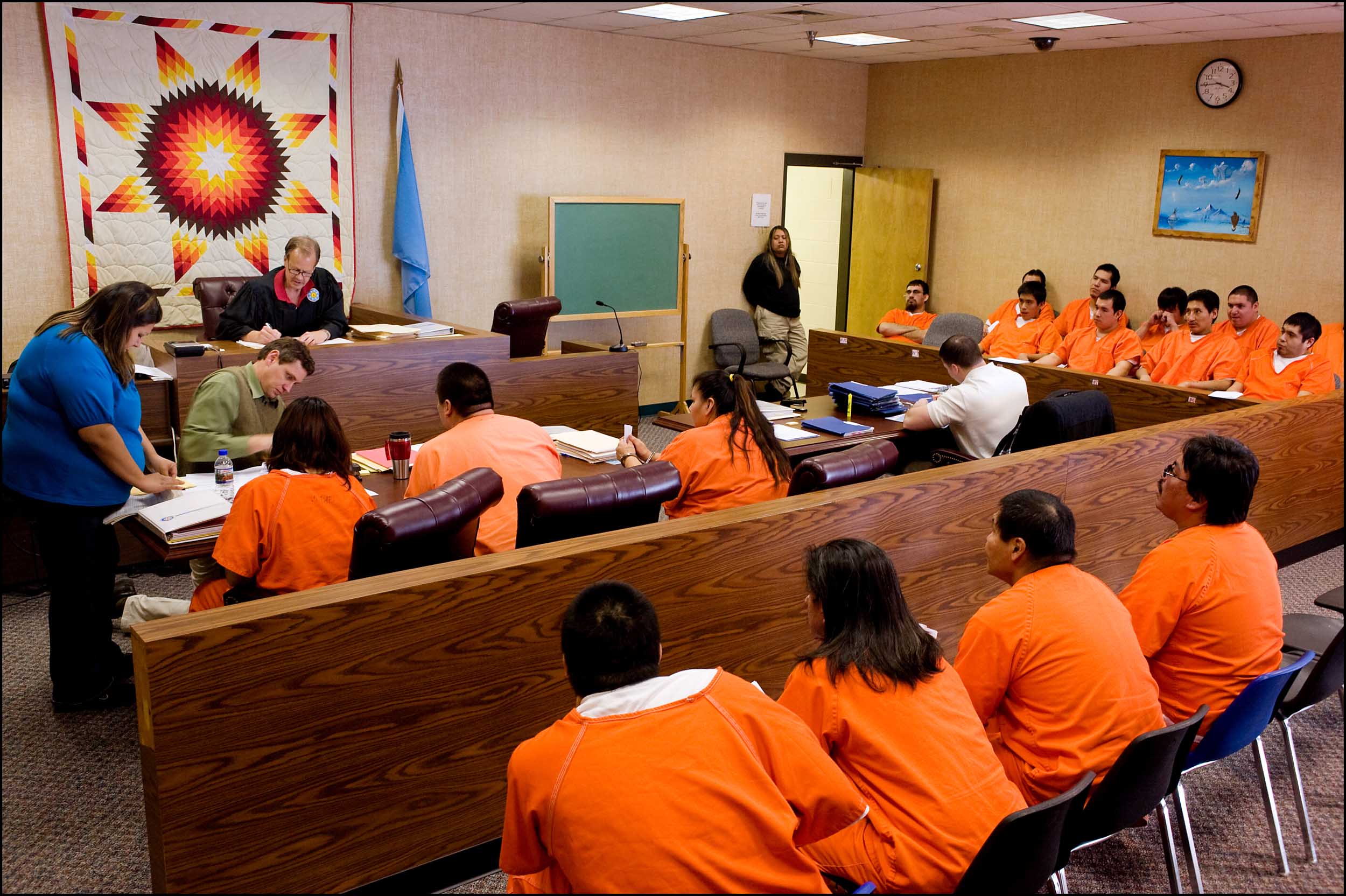
The majority of the crimes committed on the reservation are alcohol-related. William Zuger, the white chief judge of the Standing Rock tribal court, says that the result is an overloaded court system with very limited financial resources, n the territory of legendary Sioux warrior
Sitting Bull, women on an isolated
reservation straddling the states of North
and South Dakota are slowly raising their
voices. The women of Standing Rock
have chosen to speak out against rape
and domestic abuse, hoping to break the
tragic cycle of violence, alcoholism and
misery their children face. In a land of big
skies and endless horizons, the challenge
seems immense. But for these women,
helplessness is not an option.
“Treat your partner as you would a pipe,”
reads a poster on the wall of Pretty Bird
Woman House, a shelter for victims of
domestic violence in the small town of
McLaughlin, at the center of 2.3 million
acre Standing Rock reservation. If
outsiders find this wisdom a bit odd, to
the Lakota Sioux people who live here,
the descendants of Sitting Bull, it makes
perfect sense. According to legend, the
chununpa, or sacred pipe, was bestowed
on the Lakota by the White Buffalo Calf
Woman, a supernatural figure central to
their spiritual belief. It is the holiest of all
symbols, something you would never
harm.
The majority of the crimes committed on the reservation are alcohol-related. William Zuger, the white chief judge of the Standing Rock tribal court, says that the result is an overloaded court system with very limited financial resources, n the territory of legendary Sioux warrior
Sitting Bull, women on an isolated
reservation straddling the states of North
and South Dakota are slowly raising their
voices. The women of Standing Rock
have chosen to speak out against rape
and domestic abuse, hoping to break the
tragic cycle of violence, alcoholism and
misery their children face. In a land of big
skies and endless horizons, the challenge
seems immense. But for these women,
helplessness is not an option.
“Treat your partner as you would a pipe,”
reads a poster on the wall of Pretty Bird
Woman House, a shelter for victims of
domestic violence in the small town of
McLaughlin, at the center of 2.3 million
acre Standing Rock reservation. If
outsiders find this wisdom a bit odd, to
the Lakota Sioux people who live here,
the descendants of Sitting Bull, it makes
perfect sense. According to legend, the
chununpa, or sacred pipe, was bestowed
on the Lakota by the White Buffalo Calf
Woman, a supernatural figure central to
their spiritual belief. It is the holiest of all
symbols, something you would never
harm.
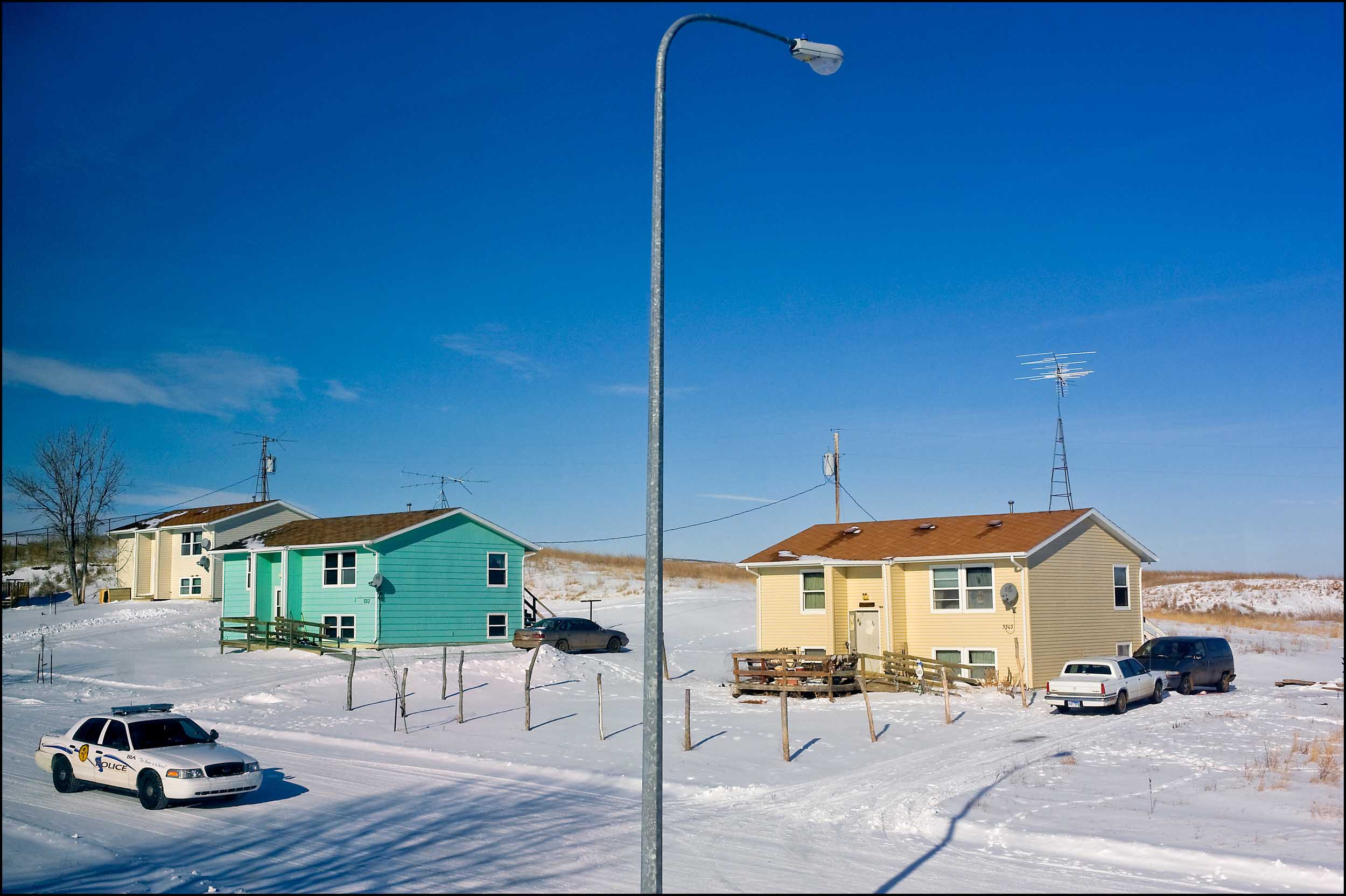
Standing Rock Sioux reservation, USA- 2009: Just four or five patrol for a large reservation it's can take an hour before being rescue, on 2009, in South and North Dakota, USA. ( Photo by Stephan Gladieu/Getty Images)
Standing Rock Sioux reservation, USA- 2009: Just four or five patrol for a large reservation it's can take an hour before being rescue, on 2009, in South and North Dakota, USA. ( Photo by Stephan Gladieu/Getty Images)

In Indian country, the maximum prison sentence that tribal court can impose for any crime is one year. For domestic violence, the sentence varies from 10 to 90 days, on 2009. In the territory of legendary Sioux warrior
Sitting Bull, women on an isolated
reservation straddling the states of North
and South Dakota are slowly raising their
voices. The women of Standing Rock
have chosen to speak out against rape
and domestic abuse, hoping to break the
tragic cycle of violence, alcoholism and
misery their children face. In a land of big
skies and endless horizons, the challenge
seems immense. But for these women,
helplessness is not an option.
“Treat your partner as you would a pipe,”
reads a poster on the wall of Pretty Bird
Woman House, a shelter for victims of
domestic violence in the small town of
McLaughlin, at the center of 2.3 million
acre Standing Rock reservation. If
outsiders find this wisdom a bit odd, to
the Lakota Sioux people who live here,
the descendants of Sitting Bull, it makes
perfect sense. According to legend, the
chununpa, or sacred pipe, was bestowed
on the Lakota by the White Buffalo Calf
Woman, a supernatural figure central to
their spiritual belief. It is the holiest of all
symbols, something you would never
harm.
In Indian country, the maximum prison sentence that tribal court can impose for any crime is one year. For domestic violence, the sentence varies from 10 to 90 days, on 2009. In the territory of legendary Sioux warrior
Sitting Bull, women on an isolated
reservation straddling the states of North
and South Dakota are slowly raising their
voices. The women of Standing Rock
have chosen to speak out against rape
and domestic abuse, hoping to break the
tragic cycle of violence, alcoholism and
misery their children face. In a land of big
skies and endless horizons, the challenge
seems immense. But for these women,
helplessness is not an option.
“Treat your partner as you would a pipe,”
reads a poster on the wall of Pretty Bird
Woman House, a shelter for victims of
domestic violence in the small town of
McLaughlin, at the center of 2.3 million
acre Standing Rock reservation. If
outsiders find this wisdom a bit odd, to
the Lakota Sioux people who live here,
the descendants of Sitting Bull, it makes
perfect sense. According to legend, the
chununpa, or sacred pipe, was bestowed
on the Lakota by the White Buffalo Calf
Woman, a supernatural figure central to
their spiritual belief. It is the holiest of all
symbols, something you would never
harm.
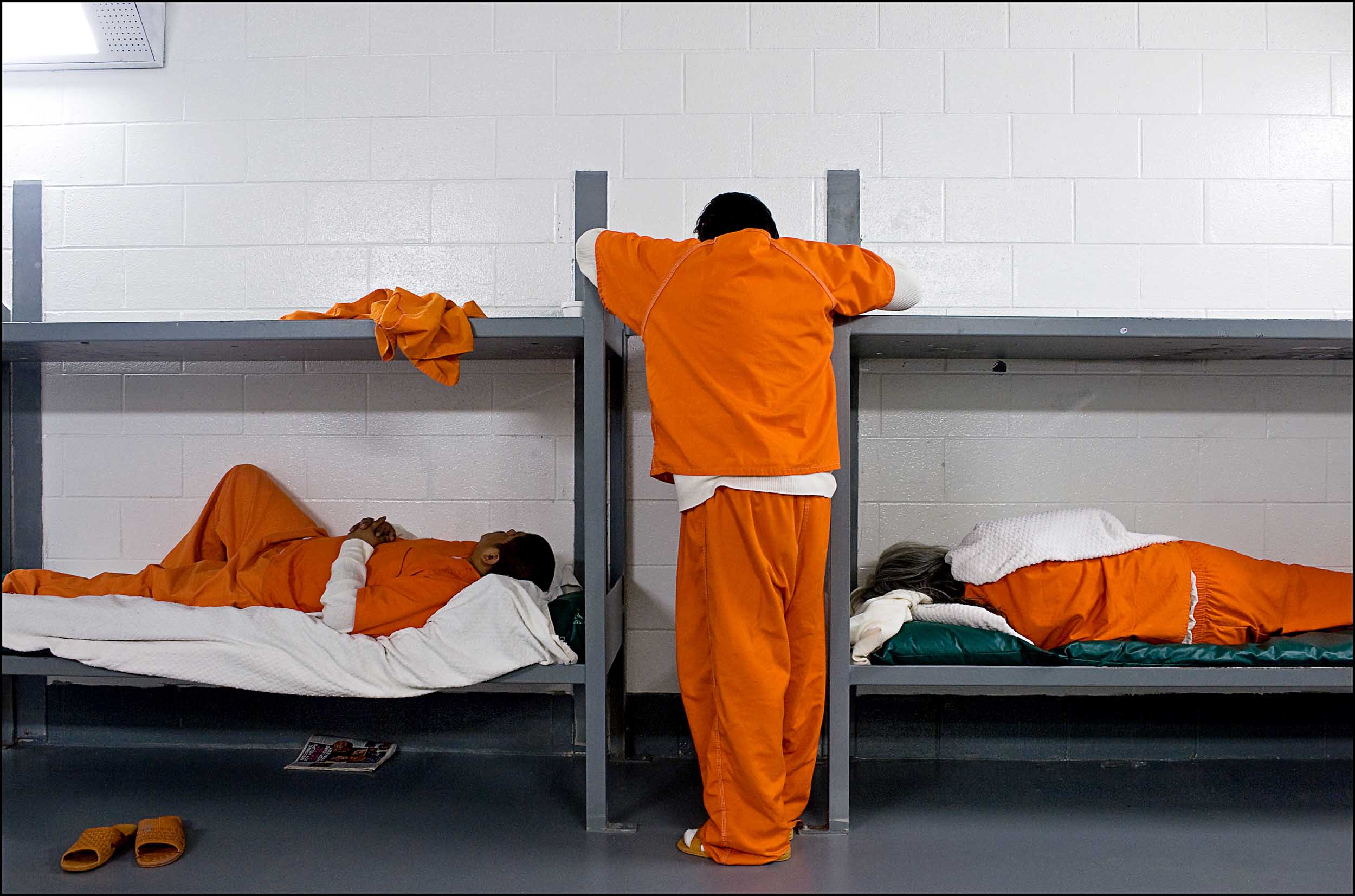
The jail at the Standing Rock reservation has 16 cells and 48 beds but sometime twice as many inmates. When the jail is overcrowded people with lesser charges are released. n the territory of legendary Sioux warrior
Sitting Bull, women on an isolated
reservation straddling the states of North
and South Dakota are slowly raising their
voices. The women of Standing Rock
have chosen to speak out against rape
and domestic abuse, hoping to break the
tragic cycle of violence, alcoholism and
misery their children face. In a land of big
skies and endless horizons, the challenge
seems immense. But for these women,
helplessness is not an option.
“Treat your partner as you would a pipe,”
reads a poster on the wall of Pretty Bird
Woman House, a shelter for victims of
domestic violence in the small town of
McLaughlin, at the center of 2.3 million
acre Standing Rock reservation. If
outsiders find this wisdom a bit odd, to
the Lakota Sioux people who live here,
the descendants of Sitting Bull, it makes
perfect sense. According to legend, the
chununpa, or sacred pipe, was bestowed
on the Lakota by the White Buffalo Calf
Woman, a supernatural figure central to
their spiritual belief. It is the holiest of all
symbols, something you would never
harm.
The jail at the Standing Rock reservation has 16 cells and 48 beds but sometime twice as many inmates. When the jail is overcrowded people with lesser charges are released. n the territory of legendary Sioux warrior
Sitting Bull, women on an isolated
reservation straddling the states of North
and South Dakota are slowly raising their
voices. The women of Standing Rock
have chosen to speak out against rape
and domestic abuse, hoping to break the
tragic cycle of violence, alcoholism and
misery their children face. In a land of big
skies and endless horizons, the challenge
seems immense. But for these women,
helplessness is not an option.
“Treat your partner as you would a pipe,”
reads a poster on the wall of Pretty Bird
Woman House, a shelter for victims of
domestic violence in the small town of
McLaughlin, at the center of 2.3 million
acre Standing Rock reservation. If
outsiders find this wisdom a bit odd, to
the Lakota Sioux people who live here,
the descendants of Sitting Bull, it makes
perfect sense. According to legend, the
chununpa, or sacred pipe, was bestowed
on the Lakota by the White Buffalo Calf
Woman, a supernatural figure central to
their spiritual belief. It is the holiest of all
symbols, something you would never
harm.
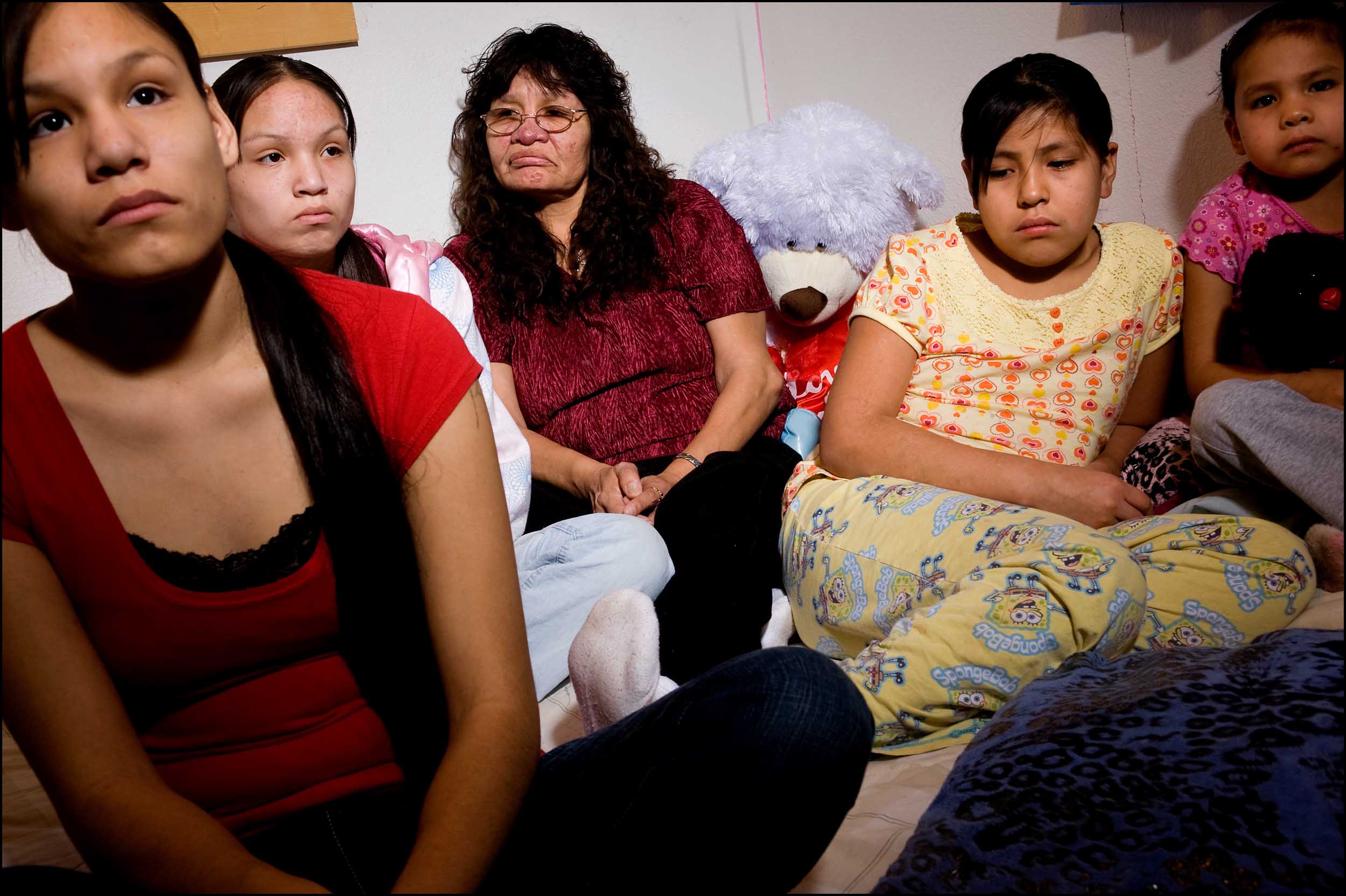
Diane Kills Crow, who suffers permanent injuries from domestic violence, poses with Tanya, her 18-year-old daughter, and Tylayna, her 10-year-old granddaughter. At 47 she’s a recovering alcoholic and now works at Pretty Bird Woman House as a women’s advocate.n the territory of legendary Sioux warrior
Sitting Bull, women on an isolated
reservation straddling the states of North
and South Dakota are slowly raising their
voices. The women of Standing Rock
have chosen to speak out against rape
and domestic abuse, hoping to break the
tragic cycle of violence, alcoholism and
misery their children face. In a land of big
skies and endless horizons, the challenge
seems immense. But for these women,
helplessness is not an option.
“Treat your partner as you would a pipe,”
reads a poster on the wall of Pretty Bird
Woman House, a shelter for victims of
domestic violence in the small town of
McLaughlin, at the center of 2.3 million
acre Standing Rock reservation. If
outsiders find this wisdom a bit odd, to
the Lakota Sioux people who live here,
the descendants of Sitting Bull, it makes
perfect sense. According to legend, the
chununpa, or sacred pipe, was bestowed
on the Lakota by the White Buffalo Calf
Woman, a supernatural figure central to
their spiritual belief. It is the holiest of all
symbols, something you would never
harm.
Diane Kills Crow, who suffers permanent injuries from domestic violence, poses with Tanya, her 18-year-old daughter, and Tylayna, her 10-year-old granddaughter. At 47 she’s a recovering alcoholic and now works at Pretty Bird Woman House as a women’s advocate.n the territory of legendary Sioux warrior
Sitting Bull, women on an isolated
reservation straddling the states of North
and South Dakota are slowly raising their
voices. The women of Standing Rock
have chosen to speak out against rape
and domestic abuse, hoping to break the
tragic cycle of violence, alcoholism and
misery their children face. In a land of big
skies and endless horizons, the challenge
seems immense. But for these women,
helplessness is not an option.
“Treat your partner as you would a pipe,”
reads a poster on the wall of Pretty Bird
Woman House, a shelter for victims of
domestic violence in the small town of
McLaughlin, at the center of 2.3 million
acre Standing Rock reservation. If
outsiders find this wisdom a bit odd, to
the Lakota Sioux people who live here,
the descendants of Sitting Bull, it makes
perfect sense. According to legend, the
chununpa, or sacred pipe, was bestowed
on the Lakota by the White Buffalo Calf
Woman, a supernatural figure central to
their spiritual belief. It is the holiest of all
symbols, something you would never
harm.
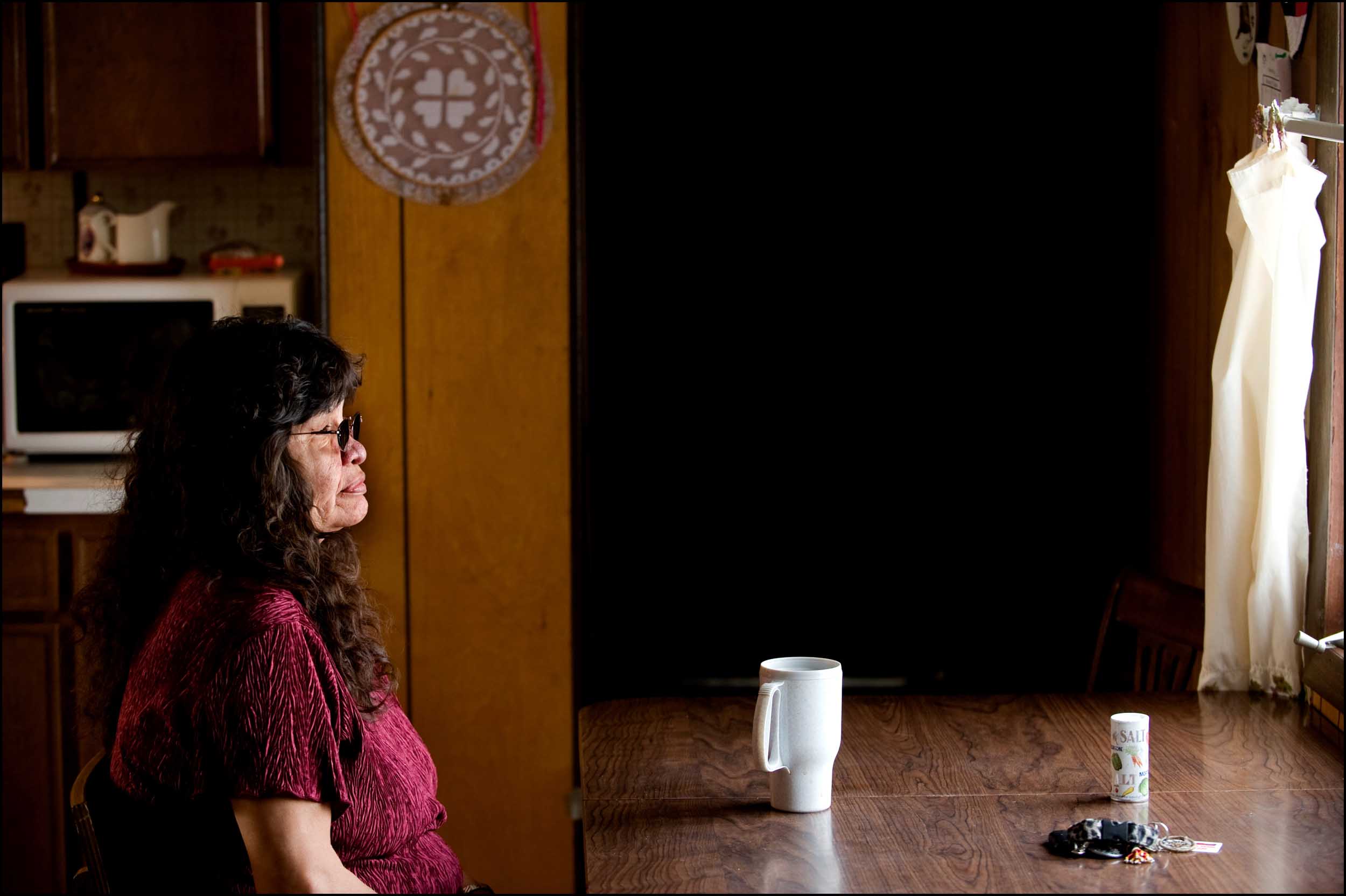
At 47, Diane Kills Crow, a former alcoholic who suffers permanent injuries from domestic violence, now works at Pretty Bird Woman House as a women’s advocate. n the territory of legendary Sioux warrior
Sitting Bull, women on an isolated
reservation straddling the states of North
and South Dakota are slowly raising their
voices. The women of Standing Rock
have chosen to speak out against rape
and domestic abuse, hoping to break the
tragic cycle of violence, alcoholism and
misery their children face. In a land of big
skies and endless horizons, the challenge
seems immense. But for these women,
helplessness is not an option.
“Treat your partner as you would a pipe,”
reads a poster on the wall of Pretty Bird
Woman House, a shelter for victims of
domestic violence in the small town of
McLaughlin, at the center of 2.3 million
acre Standing Rock reservation. If
outsiders find this wisdom a bit odd, to
the Lakota Sioux people who live here,
the descendants of Sitting Bull, it makes
perfect sense. According to legend, the
chununpa, or sacred pipe, was bestowed
on the Lakota by the White Buffalo Calf
Woman, a supernatural figure central to
their spiritual belief. It is the holiest of all
symbols, something you would never
harm.
At 47, Diane Kills Crow, a former alcoholic who suffers permanent injuries from domestic violence, now works at Pretty Bird Woman House as a women’s advocate. n the territory of legendary Sioux warrior
Sitting Bull, women on an isolated
reservation straddling the states of North
and South Dakota are slowly raising their
voices. The women of Standing Rock
have chosen to speak out against rape
and domestic abuse, hoping to break the
tragic cycle of violence, alcoholism and
misery their children face. In a land of big
skies and endless horizons, the challenge
seems immense. But for these women,
helplessness is not an option.
“Treat your partner as you would a pipe,”
reads a poster on the wall of Pretty Bird
Woman House, a shelter for victims of
domestic violence in the small town of
McLaughlin, at the center of 2.3 million
acre Standing Rock reservation. If
outsiders find this wisdom a bit odd, to
the Lakota Sioux people who live here,
the descendants of Sitting Bull, it makes
perfect sense. According to legend, the
chununpa, or sacred pipe, was bestowed
on the Lakota by the White Buffalo Calf
Woman, a supernatural figure central to
their spiritual belief. It is the holiest of all
symbols, something you would never
harm.
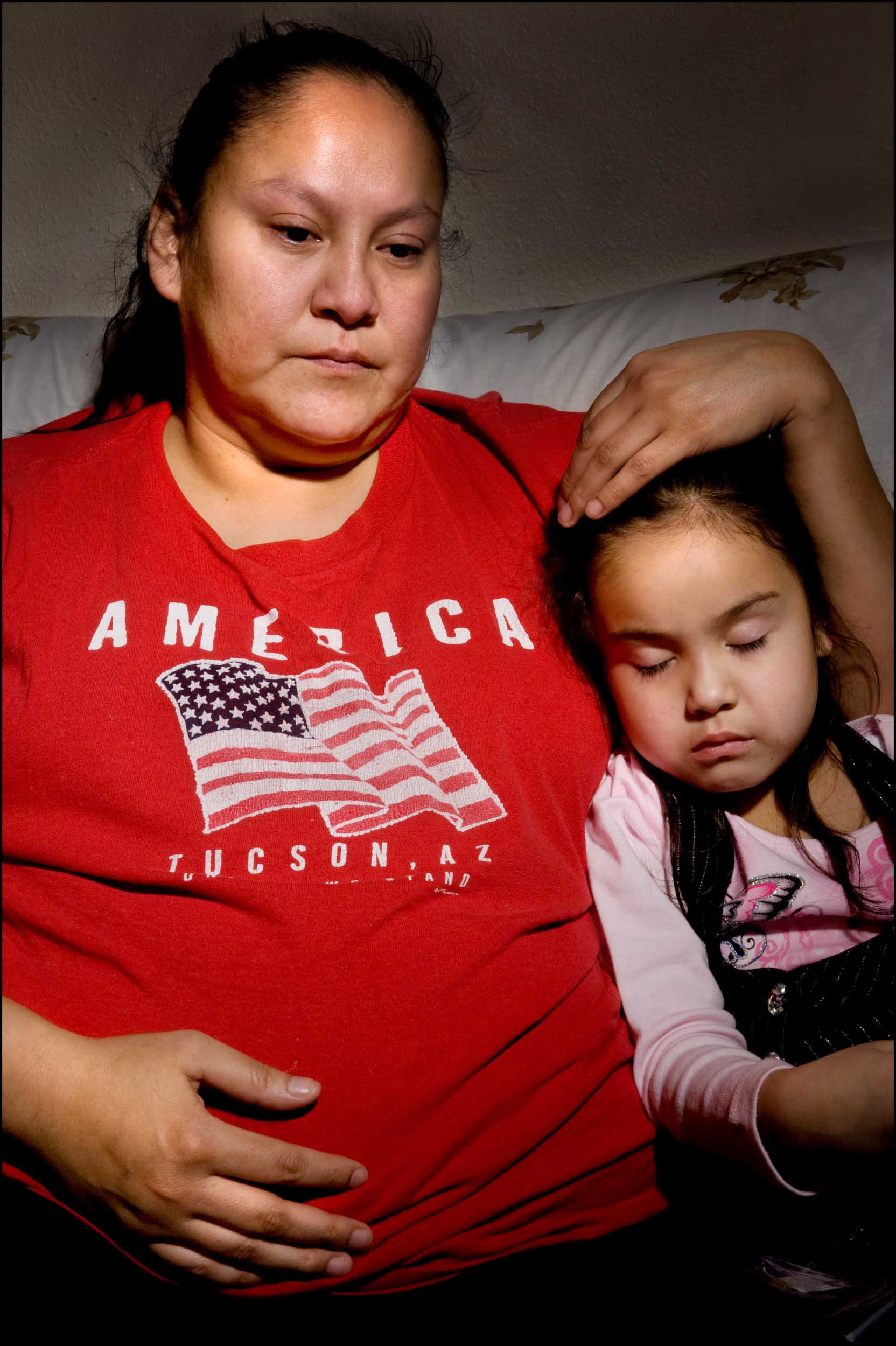
Last Thanksgiving, Lee B. (pictured here with her 5-year old daughter) stabbed her boyfriend to death with a knife when he assaulted her as she was peeling potatoes. In the territory of legendary Sioux warrior
Sitting Bull, women on an isolated
reservation straddling the states of North
and South Dakota are slowly raising their
voices. The women of Standing Rock
have chosen to speak out against rape
and domestic abuse, hoping to break the
tragic cycle of violence, alcoholism and
misery their children face. In a land of big
skies and endless horizons, the challenge
seems immense. But for these women,
helplessness is not an option.
“Treat your partner as you would a pipe,”
reads a poster on the wall of Pretty Bird
Woman House, a shelter for victims of
domestic violence in the small town of
McLaughlin, at the center of 2.3 million
acre Standing Rock reservation. If
outsiders find this wisdom a bit odd, to
the Lakota Sioux people who live here,
the descendants of Sitting Bull, it makes
perfect sense. According to legend, the
chununpa, or sacred pipe, was bestowed
on the Lakota by the White Buffalo Calf
Woman, a supernatural figure central to
their spiritual belief. It is the holiest of all
symbols, something you would never
harm.
Last Thanksgiving, Lee B. (pictured here with her 5-year old daughter) stabbed her boyfriend to death with a knife when he assaulted her as she was peeling potatoes. In the territory of legendary Sioux warrior
Sitting Bull, women on an isolated
reservation straddling the states of North
and South Dakota are slowly raising their
voices. The women of Standing Rock
have chosen to speak out against rape
and domestic abuse, hoping to break the
tragic cycle of violence, alcoholism and
misery their children face. In a land of big
skies and endless horizons, the challenge
seems immense. But for these women,
helplessness is not an option.
“Treat your partner as you would a pipe,”
reads a poster on the wall of Pretty Bird
Woman House, a shelter for victims of
domestic violence in the small town of
McLaughlin, at the center of 2.3 million
acre Standing Rock reservation. If
outsiders find this wisdom a bit odd, to
the Lakota Sioux people who live here,
the descendants of Sitting Bull, it makes
perfect sense. According to legend, the
chununpa, or sacred pipe, was bestowed
on the Lakota by the White Buffalo Calf
Woman, a supernatural figure central to
their spiritual belief. It is the holiest of all
symbols, something you would never
harm.
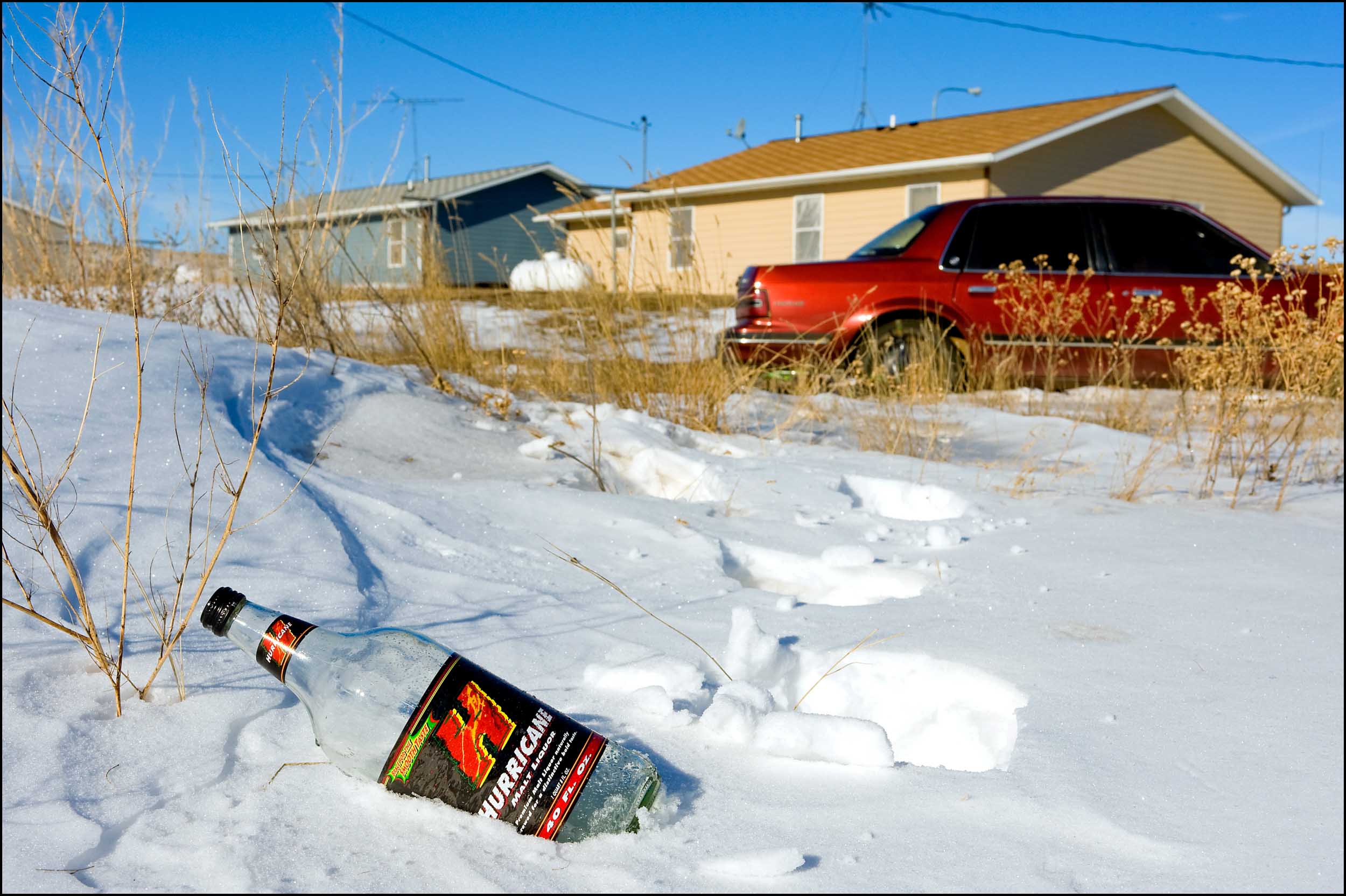
Alcohol and drug uses are widespread on the reservation. Empty bottles of hard liquors littering the ground are common sights.In the territory of legendary Sioux warrior
Sitting Bull, women on an isolated
reservation straddling the states of North
and South Dakota are slowly raising their
voices. The women of Standing Rock
have chosen to speak out against rape
and domestic abuse, hoping to break the
tragic cycle of violence, alcoholism and
misery their children face. In a land of big
skies and endless horizons, the challenge
seems immense. But for these women,
helplessness is not an option.
“Treat your partner as you would a pipe,”
reads a poster on the wall of Pretty Bird
Woman House, a shelter for victims of
domestic violence in the small town of
McLaughlin, at the center of 2.3 million
acre Standing Rock reservation. If
outsiders find this wisdom a bit odd, to
the Lakota Sioux people who live here,
the descendants of Sitting Bull, it makes
perfect sense. According to legend, the
chununpa, or sacred pipe, was bestowed
on the Lakota by the White Buffalo Calf
Woman, a supernatural figure central to
their spiritual belief. It is the holiest of all
symbols, something you would never
harm.
Alcohol and drug uses are widespread on the reservation. Empty bottles of hard liquors littering the ground are common sights.In the territory of legendary Sioux warrior
Sitting Bull, women on an isolated
reservation straddling the states of North
and South Dakota are slowly raising their
voices. The women of Standing Rock
have chosen to speak out against rape
and domestic abuse, hoping to break the
tragic cycle of violence, alcoholism and
misery their children face. In a land of big
skies and endless horizons, the challenge
seems immense. But for these women,
helplessness is not an option.
“Treat your partner as you would a pipe,”
reads a poster on the wall of Pretty Bird
Woman House, a shelter for victims of
domestic violence in the small town of
McLaughlin, at the center of 2.3 million
acre Standing Rock reservation. If
outsiders find this wisdom a bit odd, to
the Lakota Sioux people who live here,
the descendants of Sitting Bull, it makes
perfect sense. According to legend, the
chununpa, or sacred pipe, was bestowed
on the Lakota by the White Buffalo Calf
Woman, a supernatural figure central to
their spiritual belief. It is the holiest of all
symbols, something you would never
harm.
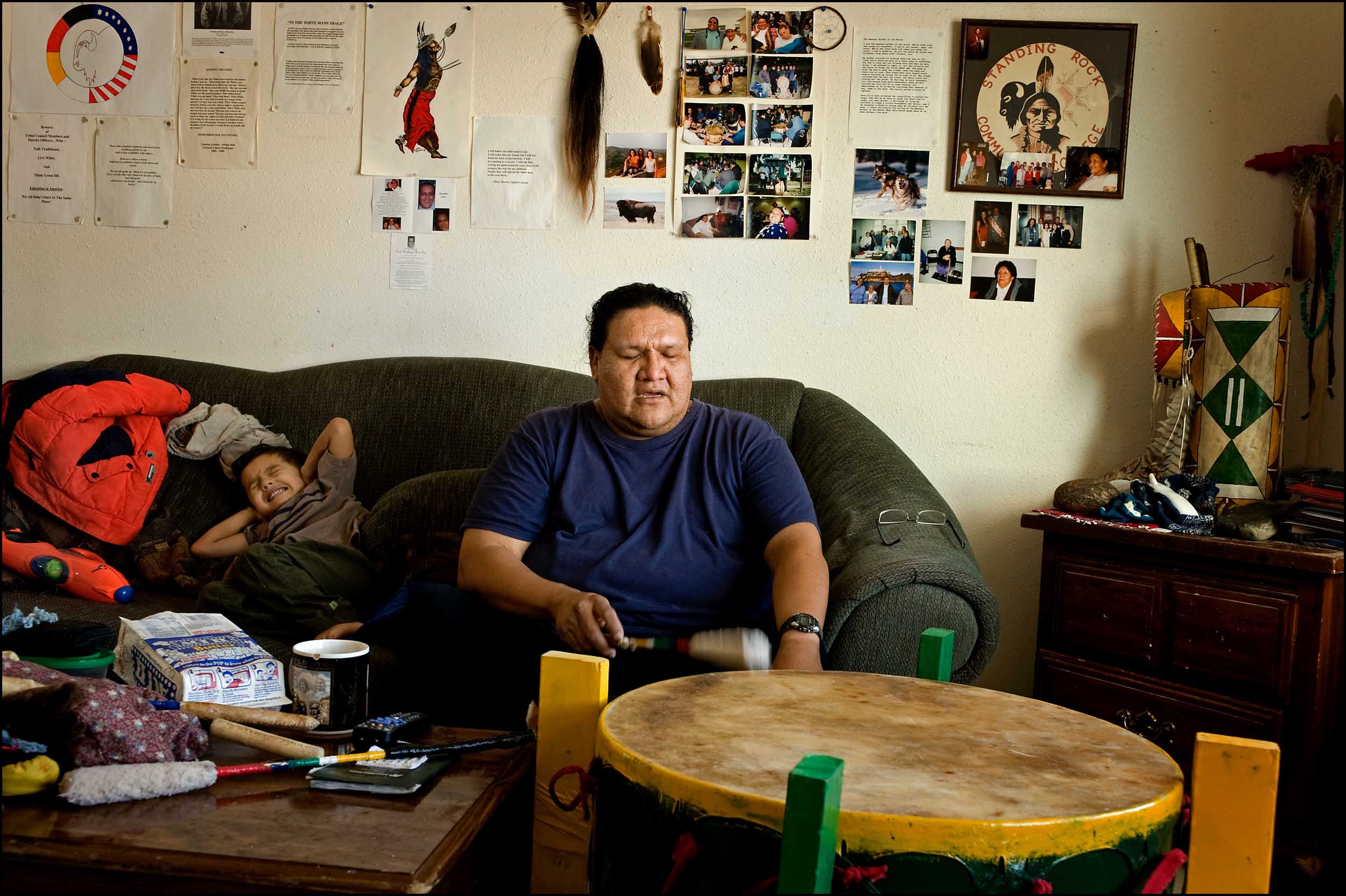
n the territory of legendary Sioux warrior
Sitting Bull, women on an isolated
reservation straddling the states of North
and South Dakota are slowly raising their
voices. The women of Standing Rock
have chosen to speak out against rape
and domestic abuse, hoping to break the
tragic cycle of violence, alcoholism and
misery their children face. In a land of big
skies and endless horizons, the challenge
seems immense. But for these women,
helplessness is not an option.
“Treat your partner as you would a pipe,”
reads a poster on the wall of Pretty Bird
Woman House, a shelter for victims of
domestic violence in the small town of
McLaughlin, at the center of 2.3 million
acre Standing Rock reservation. If
outsiders find this wisdom a bit odd, to
the Lakota Sioux people who live here,
the descendants of Sitting Bull, it makes
perfect sense. According to legend, the
chununpa, or sacred pipe, was bestowed
on the Lakota by the White Buffalo Calf
Woman, a supernatural figure central to
their spiritual belief. It is the holiest of all
symbols, something you would never
harm.
n the territory of legendary Sioux warrior
Sitting Bull, women on an isolated
reservation straddling the states of North
and South Dakota are slowly raising their
voices. The women of Standing Rock
have chosen to speak out against rape
and domestic abuse, hoping to break the
tragic cycle of violence, alcoholism and
misery their children face. In a land of big
skies and endless horizons, the challenge
seems immense. But for these women,
helplessness is not an option.
“Treat your partner as you would a pipe,”
reads a poster on the wall of Pretty Bird
Woman House, a shelter for victims of
domestic violence in the small town of
McLaughlin, at the center of 2.3 million
acre Standing Rock reservation. If
outsiders find this wisdom a bit odd, to
the Lakota Sioux people who live here,
the descendants of Sitting Bull, it makes
perfect sense. According to legend, the
chununpa, or sacred pipe, was bestowed
on the Lakota by the White Buffalo Calf
Woman, a supernatural figure central to
their spiritual belief. It is the holiest of all
symbols, something you would never
harm.
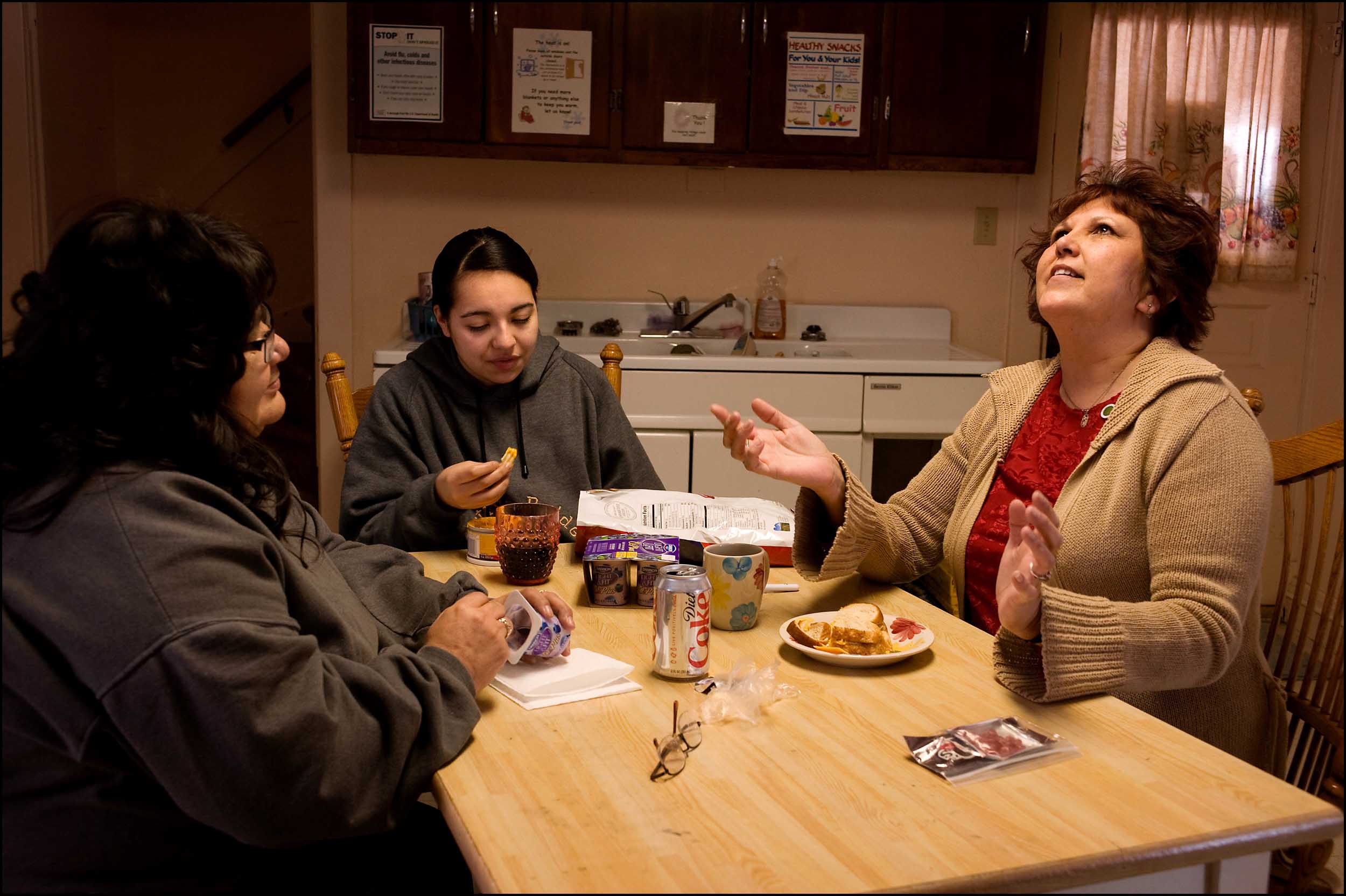
At Bridges against Domestic Violence, a shelter located in the town of Mobridge, just outside the reservation, Mary Kelly prays with 49-year old Susie and 20-year old Jessica who took refuge at the shelter. Women’s advocates have seen a renewal of spirituality among victims of domestic violence and sexual assault.
At Bridges against Domestic Violence, a shelter located in the town of Mobridge, just outside the reservation, Mary Kelly prays with 49-year old Susie and 20-year old Jessica who took refuge at the shelter. Women’s advocates have seen a renewal of spirituality among victims of domestic violence and sexual assault.

Standing Rock Sioux reservation, USA- 2009: Christina Red Lakes and her two daughters don’t have to worry about food at Pretty Bird Woman House. The advocates who run the shelter make sure the fridge is full. They also buy diapers and other supplies for the young woman and her children, on 2009, in South and North Dakota, USA. ( Photo by Stephan Gladieu/Getty Images)
Standing Rock Sioux reservation, USA- 2009: Christina Red Lakes and her two daughters don’t have to worry about food at Pretty Bird Woman House. The advocates who run the shelter make sure the fridge is full. They also buy diapers and other supplies for the young woman and her children, on 2009, in South and North Dakota, USA. ( Photo by Stephan Gladieu/Getty Images)

Casey DeCoteau took refuge at Pretty Bird Woman House after breaking up with her abusive boyfriend. She had to leave her 5-month old with the boy’s family. She cries for her son and sleeps with the baby’s bodysuit, on 2009. n the territory of legendary Sioux warrior
Sitting Bull, women on an isolated
reservation straddling the states of North
and South Dakota are slowly raising their
voices. The women of Standing Rock
have chosen to speak out against rape
and domestic abuse, hoping to break the
tragic cycle of violence, alcoholism and
misery their children face. In a land of big
skies and endless horizons, the challenge
seems immense. But for these women,
helplessness is not an option.
“Treat your partner as you would a pipe,”
reads a poster on the wall of Pretty Bird
Woman House, a shelter for victims of
domestic violence in the small town of
McLaughlin, at the center of 2.3 million
acre Standing Rock reservation. If
outsiders find this wisdom a bit odd, to
the Lakota Sioux people who live here,
the descendants of Sitting Bull, it makes
perfect sense. According to legend, the
chununpa, or sacred pipe, was bestowed
on the Lakota by the White Buffalo Calf
Woman, a supernatural figure central to
their spiritual belief. It is the holiest of all
symbols, something you would never
harm.
Casey DeCoteau took refuge at Pretty Bird Woman House after breaking up with her abusive boyfriend. She had to leave her 5-month old with the boy’s family. She cries for her son and sleeps with the baby’s bodysuit, on 2009. n the territory of legendary Sioux warrior
Sitting Bull, women on an isolated
reservation straddling the states of North
and South Dakota are slowly raising their
voices. The women of Standing Rock
have chosen to speak out against rape
and domestic abuse, hoping to break the
tragic cycle of violence, alcoholism and
misery their children face. In a land of big
skies and endless horizons, the challenge
seems immense. But for these women,
helplessness is not an option.
“Treat your partner as you would a pipe,”
reads a poster on the wall of Pretty Bird
Woman House, a shelter for victims of
domestic violence in the small town of
McLaughlin, at the center of 2.3 million
acre Standing Rock reservation. If
outsiders find this wisdom a bit odd, to
the Lakota Sioux people who live here,
the descendants of Sitting Bull, it makes
perfect sense. According to legend, the
chununpa, or sacred pipe, was bestowed
on the Lakota by the White Buffalo Calf
Woman, a supernatural figure central to
their spiritual belief. It is the holiest of all
symbols, something you would never
harm.
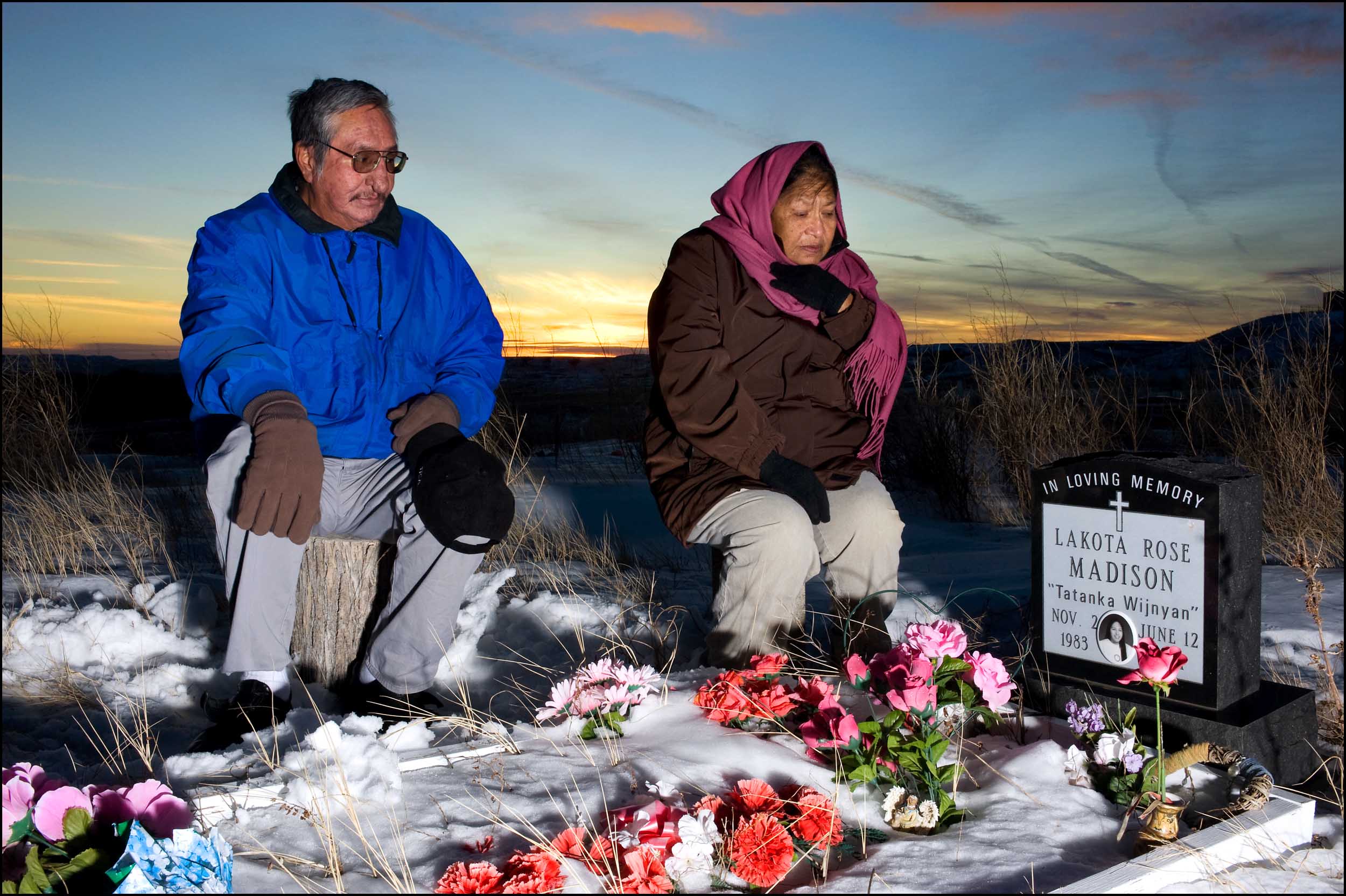
Marles and Josephine Madison are visiting their daughter’s grave in the small community of Little Eagle on the Standing Rock reservation. Lakota Rose’s life ended in a tragic way in 2001. She was tight to a tree, tortured, raped and murdered at the age of 17. In the territory of legendary Sioux warrior
Sitting Bull, women on an isolated
reservation straddling the states of North
and South Dakota are slowly raising their
voices. The women of Standing Rock
have chosen to speak out against rape
and domestic abuse, hoping to break the
tragic cycle of violence, alcoholism and
misery their children face. In a land of big
skies and endless horizons, the challenge
seems immense. But for these women,
helplessness is not an option.
“Treat your partner as you would a pipe,”
reads a poster on the wall of Pretty Bird
Woman House, a shelter for victims of
domestic violence in the small town of
McLaughlin, at the center of 2.3 million
acre Standing Rock reservation. If
outsiders find this wisdom a bit odd, to
the Lakota Sioux people who live here,
the descendants of Sitting Bull, it makes
perfect sense. According to legend, the
chununpa, or sacred pipe, was bestowed
on the Lakota by the White Buffalo Calf
Woman, a supernatural figure central to
their spiritual belief. It is the holiest of all
symbols, something you would never
harm.
Marles and Josephine Madison are visiting their daughter’s grave in the small community of Little Eagle on the Standing Rock reservation. Lakota Rose’s life ended in a tragic way in 2001. She was tight to a tree, tortured, raped and murdered at the age of 17. In the territory of legendary Sioux warrior
Sitting Bull, women on an isolated
reservation straddling the states of North
and South Dakota are slowly raising their
voices. The women of Standing Rock
have chosen to speak out against rape
and domestic abuse, hoping to break the
tragic cycle of violence, alcoholism and
misery their children face. In a land of big
skies and endless horizons, the challenge
seems immense. But for these women,
helplessness is not an option.
“Treat your partner as you would a pipe,”
reads a poster on the wall of Pretty Bird
Woman House, a shelter for victims of
domestic violence in the small town of
McLaughlin, at the center of 2.3 million
acre Standing Rock reservation. If
outsiders find this wisdom a bit odd, to
the Lakota Sioux people who live here,
the descendants of Sitting Bull, it makes
perfect sense. According to legend, the
chununpa, or sacred pipe, was bestowed
on the Lakota by the White Buffalo Calf
Woman, a supernatural figure central to
their spiritual belief. It is the holiest of all
symbols, something you would never
harm.
/
MosaïqueMosaic
LégendeLegend